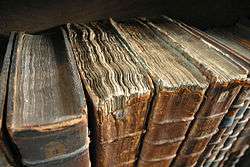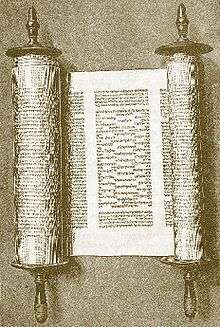Yitro (parsha)
.jpg)
Yitro, Yithro, Yisroi, Yisrau, or Yisro (יִתְרוֹ — Hebrew for the name "Jethro," the second word and first distinctive word in the parashah) is the seventeenth weekly Torah portion (פָּרָשָׁה, parashah) in the annual Jewish cycle of Torah reading and the fifth in the Book of Exodus. It constitutes Exodus 18:1–20:23. The parashah is the shortest of the weekly Torah portions in the Book of Exodus (although not the shortest in the Torah), and is made up of 4,022 Hebrew letters, 1,105 Hebrew words, and 75 verses.[1]
The parashah tells of Jethro's organizational counsel to Moses and God's revelation of the Ten Commandments to the Israelites at Mount Sinai.
Jews read it the seventeenth Sabbath after Simchat Torah, generally in January or February.[2] Jews also read part of the parashah, Exodus 19:1–20:23, as a Torah reading on the first day of the Jewish holiday of Shavuot, which commemorates the giving of the Ten Commandments.
Readings
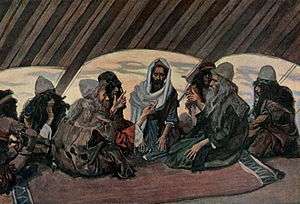
In traditional Sabbath Torah reading, the parashah is divided into seven readings, or עליות, aliyot.[3]
First reading — Exodus 18:1–12
In the first reading (עליה, aliyah), Moses' father-in-law Jethro heard all that God had done for the Israelites and brought Moses' wife Zipporah and her two sons Gershom ("I have been a stranger here") and Eliezer ("God was my help") to Moses in the wilderness at Mount Sinai.[4] Jethro rejoiced, blessed God, and offered sacrifices to God.[5]
Second reading — Exodus 18:13–23
In the second reading (עליה, aliyah), the people stood from morning until evening waiting for Moses to adjudicate their disputes.[6] Jethro counseled Moses to make known the law, and then choose capable, trustworthy, God-fearing men to serve as chiefs to judge the people, bringing only the most difficult matters to Moses.[7]
Third reading — Exodus 18:24–27
In the short third reading (עליה, aliyah), Moses heeded Jethro's advice.[8] Then Moses bade Jethro farewell, and Jethro went home.[9]
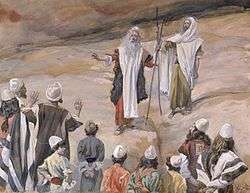
Fourth reading — Exodus 19:1–6
In the fourth reading (עליה, aliyah), three months to the day after the Israelites left Egypt, they entered the wilderness at the foot of Mount Sinai.[10] Moses went up Mount Sinai, and God told him to tell the Israelites that if they would obey God faithfully and keep God's covenant, they would be God's treasured possession, a kingdom of priests, and a holy nation.[11]
Fifth reading — Exodus 19:7–19
In the fifth reading (עליה, aliyah), when Moses told the elders, all the people answered: "All that the Lord has spoken we will do!" and Moses brought the people's words back to God.[12] God instructed Moses to have the people stay pure, wash their clothes, and prepare for the third day, when God would come down in the sight of the people, on Mount Sinai.[13] God told Moses to set bounds around the mountain, threatening whoever touched the mountain with death, and Moses did so.[14]
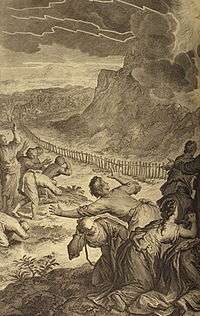
At dawn of the third day, there was thunder, lightning, a dense cloud upon the mountain, and a very loud blast of the horn.[15] Moses led the people to the foot of the mountain.[16] Mount Sinai was all in smoke, the mountain trembled violently, the blare of the horn grew louder and louder, and God answered Moses in thunder.[17]
Sixth reading — Exodus 19:20–20:14
In the sixth reading (עליה, aliyah), God came down on the top of Mount Sinai, and called Moses up.[18] God again commanded Moses to warn the people not to break through.[19]
God spoke the Ten Commandments:
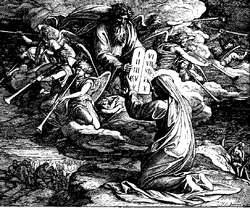
- "I the Lord am your God."[20]
- "You shall have no other gods besides Me. You shall not make for yourself a sculptured image, or any likeness of what is in the heavens above, or on the earth below, or in the waters under the earth. You shall not bow down to them or serve them."[21]
- "You shall not swear falsely by the name of the Lord your God."[22]
- "Remember the Sabbath day and keep it holy."[23]
- "Honor your father and your mother."[24]
- "You shall not murder."
- "You shall not commit adultery."
- "You shall not steal."
- "You shall not bear false witness."[25]
- "You shall not covet . . . anything that is your neighbor's."[26]
Seventh reading — Exodus 20:15–23
In the seventh reading (עליה, aliyah), seeing the thunder, lightning, and the mountain smoking, the people fell back and asked Moses to speak to them instead of God.[27] God told Moses to tell the people not make any gods of silver or gold, but an altar of earth for sacrifices.[28] God prohibited hewing the stones to make a stone altar.[29] And God prohibited ascending the altar by steps, so as not to exposed the priests' nakedness.[30]
Readings according to the triennial cycle
Jews who read the Torah according to the triennial cycle of Torah reading may read the parashah according to a different schedule. Some congregations that read the Torah according to the triennial cycle read the parashah in three divisions with the Ten Commandments in years two and three, while other congregations that read the Torah according to the triennial cycle nonetheless read the entire parashah with Ten Commandments every year.[31]
In ancient parallels
The parashah has parallels in these ancient sources:
Exodus chapter 20
The early Third Millenium BCE Sumerian wisdom text Instructions of Shuruppak contains maxims that parallel the Ten Commandments, including:
- Don’t steal anything; don’t kill yourself! . . .
- My son, don’t commit murder . . .
- Don’t laugh with a girl if she is married; the slander (arising from it) is strong! . . .
- Don’t plan lies; it is discrediting . . .
- Don’t speak fraudulently; in the end it will bind you like a trap.[32]
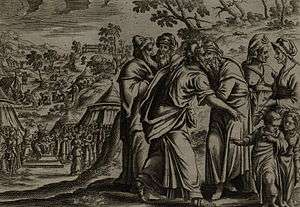
In classical rabbinic interpretation
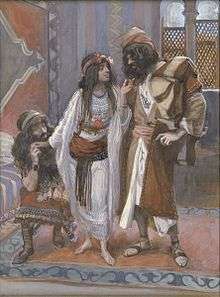
The parashah is discussed in these rabbinic sources from the era of the Mishnah and the Talmud:[33]
Exodus chapter 18
The Tannaim debated what news Jethro heard in Exodus 18:1 that caused him to adopt the faith of Moses. Rabbi Joshua said that Jethro heard of the Israelites' victory over the Amalekites, as Exodus 17:13 reports the results of that battle immediately before Exodus 18:1 reports Jethro's hearing of the news. Rabbi Eleazar of Modim said that Jethro heard of the giving of the Torah, for when God gave Israel the Torah, the sound travelled from one end of the earth to the other, and all the world's kings trembled in their palaces and sang, as Psalm 29:9 reports, "The voice of the Lord makes the hinds to tremble . . . and in His temple all say: 'Glory.'" The kings then converged upon Balaam and asked him what the tumultuous noise was that they had heard — perhaps another flood, or perhaps a flood of fire. Balaam told them that God had a precious treasure in store, which God had hidden for 974 generations before the creation of the world, and God desired to give it to God's children, as Psalm 29:11 says, "The Lord will give strength to His people." Immediately they all exclaimed the balance of Psalm 29:11: "The Lord will bless His people with peace." Rabbi Eleazar said that Jethro heard about the dividing of the Reed Sea, as Joshua 5:1 reports, "And it came to pass, when all the kings of the Amorites heard how the Lord had dried up the waters of the Jordan before the children of Israel," and Rahab the harlot too told Joshua's spies in Joshua 2:10: "For we have heard how the Lord dried up the water of the Red Sea."[34]
Rabbi Joshua interpreted Exodus 18:6 to teach that Jethro sent a messenger to Moses. Noting that Exodus 18:6 mentions each of Jethro, Zipporah, and Moses' children, Rabbi Eliezer taught that Jethro sent Moses a letter asking Moses to come out to meet Jethro for Jethro's sake; and should Moses be unwilling to do so for Jethro's sake, then to do so for the Zipporah's sake; and should Moses be reluctant to do so for her sake, then to do so the sake of Moses' children.[35]
Rabbi Pappias read the words "And Jethro said: 'Blessed be the Lord'" in Exodus 18:10 as a reproach to the Israelites, for not one of the 600,000 Israelites rose to bless God until Jethro did.[36]
Rabbi Berekiah taught in the name of Rabbi Hanina that judges must possess seven qualities, and Exodus 18:21 enumerates four: "Moreover you shall provide out of all the people able men, such as fear God, men of truth, hating unjust gain." And Deuteronomy 1:13 mentions the other three: They must be "wise men, and understanding, and full of knowledge." Scripture does not state all seven qualities together to teach that if people possessing all the seven qualities are not available, then those possessing four are selected; if people possessing four qualities are not available, then those possessing three are selected; and if even these are not available, then those possessing one quality are selected, for as Proverbs 31:10 says, "A woman of valor who can find?"[37]
.jpg)
Exodus chapter 19
The Mekhilta of Rabbi Ishmael deduced from the use of the singular form of the verb "encamped" (vayichan, וַיִּחַן) in Exodus 19:2 that all the Israelites agreed and were of one mind.[38]
A Midrash taught that God created the world so that the upper realms should be for the upper beings, and the lower realms for the lower, as Psalm 115:16 says, “The heavens are the heavens of the Lord, but the earth has He given to the children of men.” Then Moses changed the earthly into heavenly and the heavenly into earthly, for as Exodus 19:3 reports, “Moses went up to God,” and then Exodus 19:20 reports, “The Lord came down upon Mount Sinai.”[39]
Rabbi Eliezer interpreted the words, "And how I bore you on eagles' wings," in Exodus 19:4 to teach that God rapidly gathered all the Israelites and brought them to Rameses.[40] And the Mekhilta of Rabbi Ishmael further deduced from Exodus 19:4 that the Israelites traveled from Rameses to Succoth in the twinkling of an eye.[41]
.jpg)
Reading the words, "And how I bore you on eagles' wings," in Exodus 19:4, the Mekhilta of Rabbi Ishmael taught that eagles differ from all other birds because other birds carry their young between their feet, being afraid of other birds flying higher above them. Eagles, however, fear only people who might shoot arrows at them from below. Eagles, therefore, prefer that the arrows hit them rather than their children. The Mekhilta of Rabbi Ishmael compared this to a man who walked on the road with his son in front of him. If robbers, who might seek to capture his son, come from in front, the man puts his son behind him. If a wolf comes from behind, the man puts his son in front of him. If robbers come from in front and wolves from behind, the man puts his son on his shoulders. As Deuteronomy 1:31 says, "You have seen how the Lord your God bore you, as a man bears his son."[42]
Reading Exodus 19:4, a Midrash taught that God did not conduct God's Self with the Israelites in the usual manner. For usually when one acquired servants, it was on the understanding that the servants drew the master's carriage. God, however, did not do so, for God bore the Israelites, for in Exodus 19:4, God says to the Israelites, "I bore you on eagles' wings."[43]
A Midrash likened God to a bridegroom and Israel to a bride, and taught that Exodus 19:10 reports that God betrothed Israel at Sinai. The Midrash noted that the Rabbis taught that documents of betrothal and marriage are written only with the consent of both parties, and the bridegroom pays the scribe’s fee.[44] The Midrash then taught that God betrothed Israel at Sinai, reading Exodus 19:10 to say, “And the Lord said to Moses: ‘Go to the people and betroth them today and tomorrow.’” The Midrash taught that in Deuteronomy 10:1, God commissioned Moses to write the document, when God directed Moses, “Carve two tables of stone.” And Deuteronomy 31:9 reports that Moses wrote the document, saying, “And Moses wrote this law.” The Midrash then taught that God compensated Moses for writing the document by giving him a lustrous countenance, as Exodus 34:29 reports, “Moses did not know that the skin of his face sent forth beams.”[45]
The Mishnah noted that oxen were the same as all other beasts insofar as they were required by Exodus 19:12–13 to keep away from Mount Sinai.[46]
The Gemara cited Exodus 19:15 to explain how Moses decided to abstain from marital relations so as to remain pure for his communication with God. A Baraita taught that Moses did three things of his own understanding, and God approved: (1) Moses added one day of abstinence of his own understanding; (2) he separated himself from his wife (entirely, after the Revelation); and (3) he broke the Tablets of Stone (on which God had written the Ten Commandments). The Gemara explained that to reach his decision to separate himself from his wife, Moses applied an a fortiori (kal va-chomer) argument to himself. Moses noted that even though the Shechinah spoke with the Israelites on only one definite, appointed time (at Mount Sinai), God nonetheless instructed in Exodus 19:15, "Be ready against the third day: come not near a woman." Moses reasoned that if he heard from the Shechinah at all times and not only at one appointed time, how much more so should he abstain from marital contact. And the Gemara taught that we know that God approved, because in Deuteronomy 5:26 (5:27 in the NJPS), God instructed Moses (after the Revelation at Sinai), "Go say to them, 'Return to your tents'" (thus giving the Israelites permission to resume marital relations) and immediately thereafter in Deuteronomy 5:27 (5:28 in the NJPS), God told Moses, "But as for you, stand here by me" (excluding him from the permission to return). And the Gemara taught that some cite as proof of God's approval God's statement in Numbers 12:8, "with him [Moses] will I speak mouth to mouth" (as God thus distinguished the level of communication God had with Moses, after Miriam and Aaron had raised the marriage of Moses and then questioned the distinctiveness of the prophecy of Moses).[47]
The Mishnah deduced from Exodus 19:15 that a woman who emits semen on the third day after intercourse is unclean.[48]
The Rabbis compared the Israelites' encounter at Sinai to Jacob's dream in Genesis 28:12–13. The "ladder" in Jacob's dream symbolizes Mount Sinai. That the ladder is "set upon (מֻצָּב, mutzav) the earth" recalls Exodus 19:17, which says, "And they stood (וַיִּתְיַצְּבוּ, vayityatzvu) at the nether part of the mount." The words of Genesis 28:12, "and the top of it reached to heaven," echo those of Deuteronomy 4:11, "And the mountain burned with fire to the heart of heaven." "And behold the angels of God" alludes to Moses and Aaron. "Ascending" parallels Exodus 19:3: "And Moses went up to God." "And descending" parallels Exodus 19:14: "And Moses went down from the mount." And the words "and, behold, the Lord stood beside him" in Genesis 28:13 parallel the words of Exodus 19:20: "And the Lord came down upon Mount Sinai."[49]
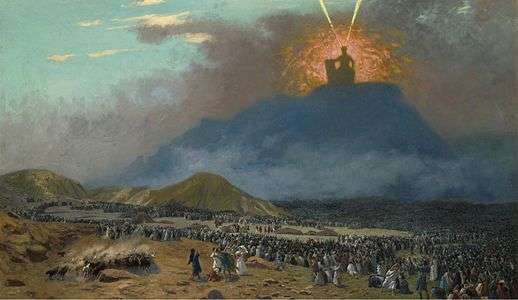
Rabbi Levi addressed the question that Deuteronomy 4:33 raises: "Did ever a people hear the voice of God speaking out of the midst of the fire, as you have heard, and live?" (Deuteronomy 4:33, in turn, refers back to the encounter at Sinai reported at Exodus 19:18–19, 20:1, and after.) Rabbi Levi taught that the world would not have been able to survive hearing the voice of God in God's power, but instead, as Psalm 29:4 says, "The voice of the Lord is with power." That is, the voice of God came according to the power of each individual — young, old, or infant — to receive it.[50]
Reading the words "And the Lord came down upon mount Sinai, to the top of the mount" in Exodus 19:20, the Mekhilta of Rabbi Ishmael supposed that one might think that God actually descended from heaven and transferred God's Presence to the mountain. Thus the Mekhilta of Rabbi Ishmael noted that Exodus 20:18 (20:19 in the NJPS) says: "You yourselves have seen that I have talked with you from heaven," and deduced that God bent down the heavens, lowering them to the top of the mountain, and spread the heavens as a person spreads a mattress on a bed, and spoke from the heavens as a person would speak from the top of a mattress.[51]
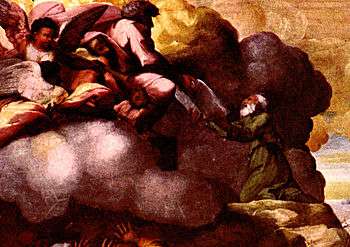
Rabbi Joshua ben Levi taught that when Moses ascended on high (as Exodus 19:20 reports), the ministering angels asked God what business one born of woman had among them. God told them that Moses had come to receive the Torah. The angels questioned why God was giving to flesh and blood the secret treasure that God had hidden for 974 generations before God created the world. The angels asked, in the words of Psalm 8:8, "What is man, that You are mindful of him, and the son of man, that You think of him?" God told Moses to answer the angels. Moses asked God what was written in the Torah. In Exodus 20:2, God said, "I am the Lord your God, Who brought you out of the Land of Egypt." So Moses asked the angels whether the angels had gone down to Egypt or were enslaved to Pharaoh. As the angels had not, Moses asked them why then God should give them the Torah. Again, Exodus 20:3 says, "You shall have no other gods," so Moses asked the angels whether they lived among peoples that engage in idol worship. Again, Exodus 20:7 (20:8 in the NJPS) says, "Remember the Sabbath day, to keep it holy," so Moses asked the angels whether they performed work from which they needed to rest. Again, Exodus 20:6 (20:7 in the NJPS) says, "You shall not take the name of the Lord your God in vain," so Moses asked the angels whether there were any business dealings among them in which they might swear oaths. Again, Exodus 20:11 (20:12 in the NJPS) says, "Honor your father and your mother," so Moses asked the angels whether they had fathers and mothers. Again, Exodus 20:12 (20:13 in the NJPS) says, "You shall not murder; you shall not commit adultery; you shall not steal," so Moses asked the angels whether there was jealousy among them and whether the Evil Tempter was among them. Immediately, the angels conceded that God's plan was correct, and each angel felt moved to love Moses and give him gifts. Even the Angel of Death confided his secret to Moses, and that is how Moses knew what to do when, as Numbers 17:11–13 reports, Moses told Aaron what to do to make atonement for the people, to stand between the dead and the living, and to check the plague.[52]
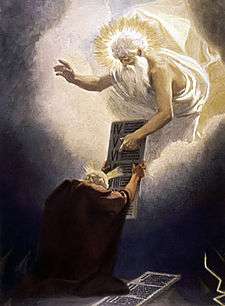
Exodus chapter 20
Rabbi Tarfon taught that God came from Mount Sinai (or others say Mount Seir) and was revealed to the children of Esau, as Deuteronomy 33:2 says, “The Lord came from Sinai, and rose from Seir to them,” and “Seir” means the children of Esau, as Genesis 36:8 says, “And Esau dwelt in Mount Seir.” God asked them whether they would accept the Torah, and they asked what was written in it. God answered that it included (in Exodus 20:12 (20:13 in the NJPS) and Deuteronomy 5:16 (5:17 in the NJPS)), “You shall do no murder.” The children of Esau replied that they were unable to abandon the blessing with which Isaac blessed Esau in Genesis 27:40, “By your sword shall you live.” From there, God turned and was revealed to the children of Ishmael, as Deuteronomy 33:2 says, “He shined forth from Mount Paran,” and “Paran” means the children of Ishmael, as Genesis 21:21 says of Ishmael, “And he dwelt in the wilderness of Paran.” God asked them whether they would accept the Torah, and they asked what was written in it. God answered that it included (in Exodus 20:12 (20:13 in the NJPS) and Deuteronomy 5:16 (5:17 in the NJPS)), “You shall not steal.” The children of Ishamel replied that they were unable to abandon their fathers’ custom, as Joseph said in Genesis 40:15 (referring to the Ishamelites’ transaction reported in Genesis 37:28), “For indeed I was stolen away out of the land of the Hebrews.” From there, God sent messengers to all the nations of the world asking them whether they would accept the Torah, and they asked what was written in it. God answered that it included (in Exodus 20:2 (20:3 in the NJPS) and Deuteronomy 5:6 (5:7 in the NJPS)), “You shall have no other gods before me.” They replied that they had no delight in the Torah, therefore let God give it to God’s people, as Psalm 29:11 says, “The Lord will give strength [identified with the Torah] to His people; the Lord will bless His people with peace.” From there, God returned and was revealed to the children of Israel, as Deuteronomy 33:2 says, “And he came from the ten thousands of holy ones,” and the expression “ten thousands” means the children of Israel, as Numbers 10:36 says, “And when it rested, he said, ‘Return, O Lord, to the ten thousands of the thousands of Israel.’” With God were thousands of chariots and 20,000 angels, and God’s right hand held the Torah, as Deuteronomy 33:2 says, “At his right hand was a fiery law to them.”[53]
Rabbi Joshua ben Levi taught that with every single word that God spoke (as Exodus 20:1 reports), the Israelites' souls departed, as Song of Songs 5:6 says: "My soul went forth when He spoke." But if their souls departed at the first word, how could they receive the second word? God revived them with the dew with which God will resurrect the dead, as Psalm 68:10 says, "You, O God, did send a plentiful rain; You did confirm your inheritance, when it was weary." Rabbi Joshua ben Levi also taught that with every word that God spoke, the Israelites retreated a distance of 12 mils, but the ministering angels led them back, as Psalm 68:13 says, "The hosts of angels march, they march (יִדֹּדוּן יִדֹּדוּן, yiddodun yiddodun)." Instead of yiddodun ("they march"), Rabbi Joshua ben Levi read yedaddun ("they lead").[54]
Rabbi Abbahu said in the name of Rabbi Johanan that when God gave the Torah, no bird twittered, no fowl flew, no ox lowed, none of the Ophanim stirred a wing, the Seraphim did not say (in the words of Isaiah 6:3) “Holy, Holy,” the sea did not roar, the creatures did not speak, the whole world was hushed into breathless silence and the voice went forth in the words of Exodus 20:2 and Deuteronomy 5:6: “I am the Lord your God.”[55]
Rabbi Levi explained that God said the words of Exodus 20:2 and Deuteronomy 5:6, “I am the Lord your God,” to reassure Israel that just because they heard many voices at Sinai, they should not believe that there are many deities in heaven, but rather they should know that God alone is God.[56]
Rabbi Tobiah bar Isaac read the words of Exodus 20:2 and Deuteronomy 5:6, “I am the Lord your God,” to teach that it was on the condition that the Israelites acknowledged God as their God that God (in the continuation of Exodus 20:2 and Deuteronomy 5:6) “brought you out of the land of Egypt.” And a Midrash compared “I am the Lord your God” to a princess who having been taken captive by robbers, was rescued by a king, who subsequently asked her to marry him. Replying to his proposal, she asked what dowry the king would give her, to which the king replied that it was enough that he had rescued her from the robbers. (So God’s delivery of the Israelites from Egypt was enough reason for the Israelites to obey God’s commandments.)[57]

Rabbi Levi said that the section beginning at Leviticus 19:1 was spoken in the presence of the whole Israelite people, because it includes each of the Ten Commandments, noting that: (1) Exodus 20:2 says, "I am the Lord your God," and Leviticus 19:3 says, "I am the Lord your God"; (2) Exodus 20:2–3 says, "You shall have no other gods," and Leviticus 19:4 says, "Nor make to yourselves molten gods"; (3) Exodus 20:6 (20:7 in the NJPS) says, "You shall not take the name of the Lord your God in vain," and Leviticus 19:12 says, "And you shall not swear by My name falsely"; (4) Exodus 20:7 (20:8 in the NJPS) says, "Remember the Sabbath day," and Leviticus 19:3 says, "And you shall keep My Sabbaths"; (5) Exodus 20:11 (20:12 in the NJPS) says, "Honor your father and your mother," and Leviticus 19:3 says, "You shall fear every man his mother, and his father"; (6) Exodus 20:12 (20:13 in the NJPS) says, "You shall not murder," and Leviticus 19:16 says, "Neither shall you stand idly by the blood of your neighbor"; (7) Exodus 20:12 (20:13 in the NJPS) says, "You shall not commit adultery," and Leviticus 20:10 says, "Both the adulterer and the adulteress shall surely be put to death; (8) Exodus 20:12 (20:13 in the NJPS) says, "You shall not steal," and Leviticus 19:11 says, "You shall not steal"; (9) Exodus 20:12 (20:13 in the NJPS) says, "You shall not bear false witness," and Leviticus 19:16 says, "You shall not go up and down as a talebearer"; and (10) Exodus 20:13 (20:14 in the NJPS) says, "You shall not covet . . . anything that is your neighbor's," and Leviticus 19:18 says, "You shall love your neighbor as yourself."[58]
The Mishnah taught that the priests recited the Ten Commandments daily.[59] The Gemara, however, taught that although the Sages wanted to recite the Ten Commandments along with the Shema in precincts outside of the Temple, they soon abolished their recitation, because the Sages did not want to lend credence to the arguments of the heretics (who might argue that Jews honored only the Ten Commandments).[60]
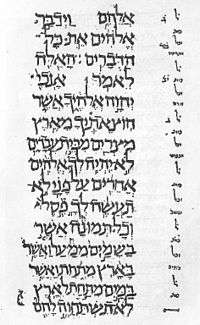
Rabbi Ishmael interpreted Exodus 20:2 (20:2–3 in the NJPS) and Deuteronomy 5:6 (5:6–7 in the NJPS) to be the first of the Ten Commandments. Rabbi Ishmael taught that Scripture speaks in particular of idolatry, for Numbers 15:31 says, “Because he has despised the word of the Lord.” Rabbi Ishmael interpreted this to mean that an idolater despises the first word among the Ten Words or Ten Commandments in Exodus 20:2 (20:2–3 in the NJPS) and Deuteronomy 5:6 (5:6–7 in the NJPS), “I am the Lord your God . . . . You shall have no other gods before Me.”[61]
The Gemara taught that the Israelites heard the words of the first two commandments (in Exodus 20:2–5 (20:3–6 in the NJPS) and Deuteronomy 5:6–9 (5:7–10 in the NJPS)) directly from God. Rabbi Simlai expounded that a total of 613 commandments were communicated to Moses — 365 negative commandments, corresponding to the number of days in the solar year, and 248 positive commandments, corresponding to the number of the parts in the human body. Rav Hamnuna said that one may derive this from Deuteronomy 33:4, "Moses commanded us Torah, an inheritance of the congregation of Jacob." The letters of the word "Torah" (תּוֹרָה) have a numerical value of 611 (as ת equals 400, ו equals 6, ר equals 200, and ה equals 5). And the Gemara did not count among the commandments that the Israelites heard from Moses the commandments, "I am the Lord your God," and, "You shall have no other gods before Me," as the Israelites heard those commandments directly from God.[62]
The Sifre taught that to commit idolatry is to deny the entire Torah.[63]
Tractate Avodah Zarah in the Mishnah, Tosefta, Jerusalem Talmud, and Babylonian Talmud interpreted the laws prohibiting idolatry in Exodus 20:2–5 (20:3–6 in the NJPS) and Deuteronomy 5:6–9 (5:7–10 in the NJPS).[64]
The Mishnah taught that those who engaged in idol worship were executed, whether they served it, sacrificed to it, offered it incense, made libations to it, prostrated themselves to it, accepted it as a god, or said to it "You are my god." But those who embraced, kissed, washed, anointed, clothed, or swept or sprinkled the ground before an idol merely transgressed the negative commandment of Exodus 20:4 (20:5 in the NJPS) and were not executed.[65]
The Gemara reconciled apparently discordant verses touching on vicarious responsibility. The Gemara noted that Deuteronomy 24:16 states: "The fathers shall not be put to death for the children, neither shall the children be put to death for the fathers; every man shall be put to death for his own sin," but Exodus 20:4 (20:5 in the NJPS) says: "visiting the iniquity of the fathers upon the children." The Gemara cited a Baraita that interpreted the words "the iniquities of their fathers shall they pine away with them" in Leviticus 26:39 to teach that God punishes children only when they follow their parents' sins. The Gemara then questioned whether the words "they shall stumble one upon another" in Leviticus 26:37 do not teach that one will stumble through the sin of the other, that all are held responsible for one another. The Gemara answered that the vicarious responsibility of which Leviticus 26:37 speaks is limited to those who have the power to restrain their fellow from evil but do not do so.[66]
Tractates Nedarim and Shevuot in the Mishnah, Tosefta, Jerusalem Talmud, and Babylonian Talmud interpreted the laws of vows and oaths in Exodus 20:6 (20:7 in the NJPS), Leviticus 5:1–10 and 19:12, Numbers 30:2–17, and Deuteronomy 23:24.[67]
Tractate Shabbat in the Mishnah, Tosefta, Jerusalem Talmud, and Babylonian Talmud interpreted the laws of the Sabbath in Exodus 16:23 and 29; 20:7–10 (20:8–11 in the NJPS); 23:12; 31:13–17; 35:2–3; Leviticus 19:3; 23:3; Numbers 15:32–36; and Deuteronomy 5:11 (5:12 in the NJPS).[68]
The Mishnah interpreted the prohibition of animals working in Exodus 20:9 (20:10 in the NJPS) to teach that on the Sabbath, animals could wear their tethers, and their caretakers could lead them by their tethers and sprinkle or immerse them with water.[69] The Mishnah taught that a donkey could go out with a saddle cushion tied to it, rams strapped, ewes covered, and goats with their udders tied. Rabbi Jose forbade all these, except covering ewes. Rabbi Judah allowed goats to go out with their udders tied to dry, but not to save their milk.[70] The Mishnah taught that animals could not go out with a pad tied to their tails. A driver could not tie camels together and pull one of them, but a driver could take the leads of several camels in hand and pull them.[71] The Mishnah prohibited donkeys with untied cushions, bells, ladder–shaped yokes, or thongs around their feet; fowls with ribbons or leg straps; rams with wagons; ewes protected by wood chips in their noses; calves with little yokes; and cows with hedgehog skins or straps between their horns. The Mishnah reported that Rabbi Eleazar ben Azariah's cow used to go out with a thong between its horns, but without the consent of the Rabbis.[72]
A Midrash cited the words of Exodus 20:9 (20:10 in the NJPS), “And your stranger who is within your gates,” to show God’s injunction to welcome the stranger. The Midrash compared the admonition in Isaiah 56:3, “Neither let the alien who has joined himself to the Lord speak, saying: ‘The Lord will surely separate me from his people.’” (Isaiah enjoined Israelites to treat the convert the same as a native Israelite.) Similarly, the Midrash quoted Job 31:32, in which Job said, “The stranger did not lodge in the street” (that is, none were denied hospitality), to show that God disqualifies no creature, but receives all; the city gates were open all the time and anyone could enter them. The Midrash equated Job 31:32, “The stranger did not lodge in the street,” with the words of Exodus 20:9 (20:10 in the NJPS), Deuteronomy 5:13 (5:14 in the NJPS), and Deuteronomy 31:12, “And your stranger who is within your gates” (which implies that strangers were integrated into the midst of the community). Thus the Midrash taught that these verses reflect the Divine example of accepting all creatures.[73]
The Mishnah taught that every act that violates the law of the Sabbath also violates the law of a festival, except that one may prepare food on a festival but not on the Sabbath.[74]
The Tanna Devei Eliyahu taught that if you live by the commandment establishing the Sabbath (in Exodus 20:7 (20:8 in the NJPS) and Deuteronomy 5:11 (5:12 in the NJPS)), then (in the words of Isaiah 62:8) “The Lord has sworn by His right hand, and by the arm of His strength: ‘Surely I will no more give your corn to be food for your enemies.” If, however, you transgress the commandment, then it will be as in Numbers 32:10–11, when “the Lord’s anger was kindled in that day, and He swore, saying: ‘Surely none of the men . . . shall see the land.’”[75]
.jpg)
.jpg)
The Mishnah taught that both men and women are obligated to carry out all commandments concerning their fathers.[76] Rav Judah interpreted the Mishnah to mean that both men and women are bound to perform all precepts concerning a father that are incumbent upon a son to perform for his father.[77]
A Midrash noted that almost everywhere, Scripture mentions a father's honor before the mother's honor. (See, for example, Exodus 20:11 (20:12 in NJSP), Deuteronomy 5:15 (5:16 in the NJPS), 27:16.) But Leviticus 19:3 mentions the mother first to teach that one should honor both parents equally.[78]
It was taught in a Baraita that Judah the Prince said that God knows that a son honors his mother more than his father, because the mother wins him over with words. Therefore, (in Exodus 20:11 (20:12 in NJSP)) God put the honor of the father before that of the mother. God knows that a son fears his father more than his mother, because the father teaches him Torah. Therefore, (in Leviticus 19:3) God put the fear of the mother before that of the father.[79]
Our Rabbis taught in a Baraita what it means to "honor" and "revere" one's parents within the meaning of Exodus 20:11 (20:12 in NJSP) (honor), Leviticus 19:3 (revere), and Deuteronomy 5:15 (5:16 in the NJPS) (honor). To "revere" means that the child must neither stand nor sit in the parent's place, nor contradict the parent's words, nor engage in a dispute to which the parent is a party. To "honor" means that the child must give the parent food and drink and clothes, and take the parent in and out.[80]
Noting that Exodus 20:11 (20:12 in NJSP) commands, "Honor your father and your mother," and Proverbs 3:9 directs, "Honor the Lord with your substance," the Rabbis taught in a Baraita that Scripture thus likens the honor due to parents to that due to God. Similarly, as Leviticus 19:3 commands, "You shall fear your father and mother," and Deuteronomy 6:13 commands, "The Lord your God you shall fear and you shall serve," Scripture likens the fear of parents to the fear of God. And as Exodus 21:17 commands, "He that curses his father or his mother shall surely be put to death," and Leviticus 24:15 commands, "Whoever curses his God shall bear his sin," Scripture likens cursing parents to cursing God. But the Baraita conceded that with respect to striking (which Exodus 21:15 addresses with regard to parents), that it is certainly impossible (with respect to God). The Baraita concluded that these comparisons between parents and God are only logical, since the three (God, the mother, and the father) are partners in creation of the child. For the Rabbis taught in a Baraita that there are three partners in the creation of a person — God, the father, and the mother. When one honors one's father and mother, God considers it as if God had dwelt among them and they had honored God. And a Tanna taught before Rav Nachman that when one vexes one's father and mother, God considers it right not to dwell among them, for had God dwelt among them, they would have vexed God.[79]
Chapter 9 of Tractate Sanhedrin in the Mishnah and Babylonian Talmud interpreted the laws of murder in Exodus 20:12 (20:13 in the NJPS) and Deuteronomy 5:16 (5:17 in the NJPS).[81] The Mishnah taught that one who intended to kill an animal but killed a person instead was not liable for murder. One was not liable for murder who intended to kill an unviable fetus and killed a viable child. One was not liable for murder who intended to strike the victim on the loins, where the blow was insufficient to kill, but struck the heart instead, where it was sufficient to kill, and the victim died. One was not liable for murder who intended to strike the victim on the heart, where it was enough to kill, but struck the victim on the loins, where it was not, and yet the victim died.[82]
Interpreting the consequences of murder (prohibited in Exodus 20:12 (20:13 in the NJPS) and Deuteronomy 5:16 (5:17 in the NJPS)), the Mishnah taught that God created the first human (Adam) alone to teach that Scripture imputes guilt to one who destroys a single soul of Israel as though that person had destroyed a complete world, and Scripture ascribes merit to one who preserves a single soul of Israel as though that person had preserved a complete world.[83]
The Tanna Devei Eliyahu taught that if you live by the commandment prohibiting murder (in Exodus 20:12 (20:13 in the NJPS) and Deuteronomy 5:16 (5:17 in the NJPS)), then (in the words of Leviticus 26:6) “the sword shall not go through your land.” If, however, you transgress the commandment, then (in God’s words in Leviticus 26:33) “I will draw out the sword after you.”[84]
Rabbi Josiah taught that we learn the formal prohibition against kidnapping from the words "You shall not steal" in Exodus 20:12 (20:13 in the NJPS) (since Deuteronomy 22:7 and Exodus 21:16 merely state the punishment for abduction). Rabbi Johanan taught that we learn it from Leviticus 25:42, "They shall not be sold as bondsmen." The Gemara harmonized the two positions by concluding that Rabbi Josiah referred to the prohibition for abduction, while Rabbi Johanan referred to the prohibition for selling a kidnapped person. Similarly, the Rabbis taught in a Baraita that Exodus 20:12 (20:13 in the NJPS), "You shall not steal," refers to the stealing of human beings. To the potential objection that Exodus 20:12 (20:13 in the NJPS) refers to property theft, the Baraita responded that one of the thirteen principles by which we interpret the Torah is that a law is interpreted by its general context, and the Ten Commandments speak of capital crimes (like murder and adultery). (Thus "You shall not steal" must refer to a capital crime and thus to kidnapping.) Another Baraita taught that the words "You shall not steal" in Leviticus 19:11 refer to theft of property. To the potential objection that Leviticus 19:11 refers to the theft of human beings, the Baraita responded that the general context of Leviticus 19:10–15 speaks of money matters; therefore Leviticus 19:11 must refer to monetary theft.[85]
.jpg)
According to the Mishnah, if witnesses testified that a person was liable to receive 40 lashes, and the witnesses turned out to have perjured themselves, then Rabbi Meir taught that the perjurers received 80 lashes — 40 on account of the commandment of Exodus 20:12 (20:13 in the NJPS) not to bear false witness and 40 on account of the instruction of Deuteronomy 19:19 to do to perjurers as they intended to do to their victims — but the Sages said that they received only 40 lashes.[86]
Rabbi Shimon ben Lakish taught that the commandment of Exodus 20:12 (20:13 in the NJPS) not to bear false witness included every case of false testimony.[87]
Rav Aha of Difti said to Ravina that one can transgress the commandment not to covet in Exodus 20:13 (20:14 in NJSP) and Deuteronomy 5:17 (5:18 in the NJPS) even in connection with something for which one is prepared to pay.[88]
The Mekhilta of Rabbi Ishmael asked whether the commandment not to covet in Exodus 20:13 (20:14 in NJSP) applied so far as to prohibit merely expressing one's desire for one's neighbor's things in words. But the Mekhilta of Rabbi Ishmael noted that Deuteronomy 7:25 says, "You shall not covet the silver or the gold that is on them, nor take it for yourself." And the Mekhilta of Rabbi Ishmael reasoned that just as in Deuteronomy 7:25 the word "covet" applies only to prohibit the carrying out of one's desire into practice, so also Exodus 20:13 (20:14 in NJSP) prohibits only the carrying out of one's desire into practice.[89]
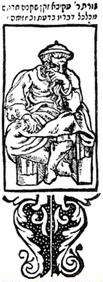
The Mekhilta of Rabbi Simeon distinguished the prohibition of Exodus 20:13 (20:14 in NJSP), "You shall not covet," from that of Deuteronomy 5:17 (5:18 in the NJPS), "neither shall you desire." The Mekhilta of Rabbi Simeon taught that the differing terms mean that one can incur liability for desiring in and of itself and for coveting in and of itself.[90]
Rabbi Ishmael interpreted the words "all the people perceived the thunderings, and the lightnings, and the voice of the horn" in Exodus 20:14 (20:15 in the NJPS) to mean that the people saw what could be seen and heard what could be heard. But Rabbi Akiva said that they saw and heard what was perceivable, and they saw the fiery word of God strike the tablets.[91]
The Gemara taught that Exodus 20:16 (20:17 in the NJPS) sets forth one of the three most distinguishing virtues of the Jewish People. The Gemara taught that David told the Gibeonites that the Israelites are distinguished by three characteristics: They are merciful, bashful, and benevolent. They are merciful, for Deuteronomy 13:18 says that God would "show you (the Israelites) mercy, and have compassion upon you, and multiply you." They are bashful, for Exodus 20:16 (20:17 in the NJPS) says "that God's fear may be before you (the Israelites)." And they are benevolent, for Genesis 18:19 says of Abraham "that he may command his children and his household after him, that they may keep the way of the Lord, to do righteousness and justice." The Gemara taught that David told the Gibeonites that only one who cultivates these three characteristics is fit to join the Jewish People.[92]
A Midrash likened the commandment of Deuteronomy 25:15 to have just weights and measures to that of Exodus 20:19 (20:20 in the NJPS) not to make gods of silver, or gods of gold. Reading Deuteronomy 25:15, Rabbi Levi taught that blessed actions bless those who are responsible for them, and cursed actions curse those who are responsible for them. The Midrash interpreted the words of Deuteronomy 25:15, "A perfect and just weight you shall have," to mean that if one acts justly, one will have something to take and something to give, something to buy and something to sell. Conversely, the Midrash read Deuteronomy 25:13–14 to teach, "You shall not have possessions if there are in your bag diverse weights, a great and a small. You shall not have possessions if there are in your house diverse measures, a great and a small." Thus, if one does employ deceitful measures, one will not have anything to take or give, to buy or sell. The Midrash taught that God tells businesspeople that they "may not make" one measure great and another small, but if they do, they "will not make" a profit. The Midrash likened this commandment to that of Exodus 20:19 (20:20 in the NJPS) "You shall not make with Me gods of silver, or gods of gold, you shall not make," for if a person did make gods of silver and gold, then that person would not be able to afford to have even gods of wood or stone.[93]

The Mishnah deduced from Exodus 20:20 (20:21 in the NJPS) that even when only a single person sits occupied with Torah, the Shechinah is with the student.[94]
Rabbi Isaac taught that God reasoned that if God said in Exodus 20:20 (20:21 in the NJPS), "An altar of earth you shall make to Me [and then] I will come to you and bless you," thus revealing God's Self to bless the one who built an altar in God's name, then how much more should God reveal God's Self to Abraham, who circumcised himself for God's sake. And thus, "the Lord appear to him."[95]
Bar Kappara taught that every dream has its interpretation. Thus Bar Kappara taught that the "ladder" in Jacob's dream of Genesis 28:12 symbolizes the stairway leading up to the altar in the Temple in Jerusalem. "Set upon the earth" implies the altar, as Exodus 20:20 (20:21 in the NJPS) says, "An altar of earth you shall make for Me." "And the top of it reached to heaven" implies the sacrifices, the odor of which ascended to heaven. "The angels of God" symbolize the High Priests. "Ascending and descending on it" describes the priests ascending and descending the stairway of the altar. And the words "and, behold, the Lord stood beside him" in Genesis 28:13 once again invoke the altar, as in Amos 9:1, the prophet reports, "I saw the Lord standing beside the altar."[49]
In medieval Jewish interpretation
The parashah is discussed in these medieval Jewish sources:[96]

Exodus chapter 20
Interpreting the prohibition of coveting in Exodus 20:13 (20:14 in NJSP) and desiring in Deuteronomy 5:17 (5:18 in the NJPS), Maimonides taught that any person who covets a servant, a maidservant, a house, or utensils that belong to a colleague, or any other article that the person can purchase from the colleague and pressures the colleague with friends and requests until the colleague agrees to sell, violates a negative commandment, even though the person pays much money for it, as Exodus 20:13 (20:14 in NJSP) says, "Do not covet." Maimonides taught that the violation of this commandment was not punished by lashes, because it does not involve a deed. Maimonides taught that a person does not violate Exodus 20:13 (20:14 in NJSP) until the person actually takes the article that the person covets, as reflected by Deuteronomy 7:25: "Do not covet the gold and silver on these statues and take it for yourself." Maimonides read the word for "covet" in both Exodus 20:13 (20:14 in NJSP) and Deuteronomy 7:25 to refer to coveting accompanied by a deed. Maimonides taught that a person who desires a home, a spouse, utensil, or anything else belonging to a colleague that the person can acquire violates a negative commandment when the person thinks in the person's heart how it might be possible to acquire this thing from the colleague. Maimonides read Deuteronomy 5:17 (5:18 in the NJPS), "Do not desire," to refer even to feelings in the heart alone. Thus, a person who desires another person's property violates one negative commandment. A person who purchases an object the person desires after pressuring the owners and repeatedly asking them, violates two negative commandments. For that reason, Maimonides concluded, the Torah prohibits both desiring in Deuteronomy 5:17 (5:18 in the NJPS) and coveting in Exodus 20:13 (20:14 in NJSP). And if the person takes the article by robbery, the person violates three negative commandments.[97]
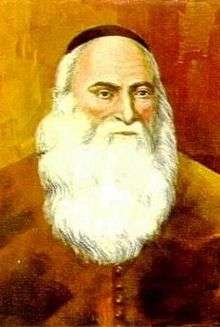
Isaac Abrabanel noted that the order of Exodus 20:13 (20:14 in NJSP), "You shall not covet your neighbor's house; you shall not covet your neighbor's wife," differs from that in Deuteronomy 5:17 (5:18 in the NJPS), "Neither shall you covet thy neighbor's wife; neither shall you desire your neighbor's house." Abrabanel deduced that Exodus 20:13 (20:14 in NJSP) mentions the things that might be coveted in the order that a person has need of them, and what it behooves a person to try to acquire in this world. Therefore, the first coveted item mentioned is a person's house, then the person's spouse, then the person's servants, and lastly the person's animals that do not speak. Deuteronomy 5:17 (5:18 in the NJPS), however, mentions them in the order of the gravity of the sin and evil. The most evil coveting is that of another person's spouse, as in David's coveting of Bathsheba. Next in magnitude of evil comes coveting the house in which one's neighbor lives, lest the person evict the neighbor and take the neighbor's home. Next comes the neighbor's field, for although a person does not live there as in the house, it is the source of the neighbor's livelihood and inheritance, as in the affair of Ahab and the vineyard of Naboth the Jezreelite. After the field Deuteronomy 5:17 (5:18 in the NJPS) mentions servants, who Abrabanel valued of lesser importance than one's field. Next come the neighbor's animals, who do not have the faculty of speech, and lastly, to include the neighbor's inanimate moveable property, Deuteronomy 5:17 (5:18 in the NJPS) says "and anything that is your neighbor's."[98]
Maimonides taught that God told the Israelites to erect the altar to God’s name in Exodus 20:20 (20:21 in the NJPS) and instituted the practice of sacrifices generally as transitional steps to wean the Israelites off of the worship of the times and move them toward prayer as the primary means of worship. Maimonides noted that in nature, God created animals that develop gradually. For example, when a mammal is born, it is extremely tender, and cannot eat dry food, so God provided breasts that yield milk to feed the young animal, until it can eat dry food. Similarly, Maimonides taught, God instituted many laws as temporary measures, as it would have been impossible for the Israelites suddenly to discontinue everything to which they had become accustomed. So God sent Moses to make the Israelites (in the words of Exodus 19:6) “a kingdom of priests and a holy nation.” But the general custom of worship in those days was sacrificing animals in temples that contained idols. So God did not command the Israelites to give up those manners of service, but allowed them to continue. God transferred to God’s service what had formerly served as a worship of idols, and commanded the Israelites to serve God in the same manner — namely, to build to a Sanctuary (Exodus 25:8), to erect the altar to God’s name (Exodus 20:20 (20:21 in the NJPS), to offer sacrifices to God (Leviticus 1:2), to bow down to God, and to burn incense before God. God forbad doing any of these things to any other being and selected priests for the service in the temple in Exodus 28:41. By this Divine plan, God blotted out the traces of idolatry, and established the great principle of the Existence and Unity of God. But the sacrificial service, Maimonides taught, was not the primary object of God’s commandments about sacrifice; rather, supplications, prayers, and similar kinds of worship are nearer to the primary object. Thus God limited sacrifice to only one temple (see Deuteronomy 12:26) and the priesthood to only the members of a particular family. These restrictions, Maimonides taught, served to limit sacrificial worship, and kept it within such bounds that God did not feel it necessary to abolish sacrificial service altogether. But in the Divine plan, prayer and supplication can be offered everywhere and by every person, as can be the wearing of tzitzit (Numbers 15:38) and tefillin (Exodus 13:9, 16) and similar kinds of service.[99]
In modern interpretation
The parashah is discussed in these modern sources:
Exodus chapter 20
Although Jewish tradition came to consider the words “I am the Lord your God” in Exodus 20:1 the first of the Ten Commandments, many modern scholars saw not a command, but merely a proclamation announcing the Speaker.[100]
Commandments
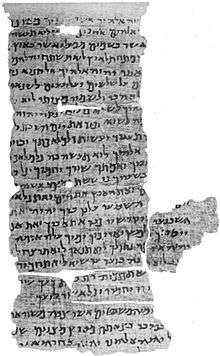
According to Sefer ha-Chinuch, there are 3 positive and 14 negative commandments in the parashah:[101]
- To know there is a God[20]
- Not to believe in divinity besides God[102]
- Not to make an idol for yourself[103]
- Not to worship idols in the manner they are worshiped[104]
- Not to worship idols in the four ways we worship God[104]
- Not to take God's Name in vain.[22]
- To sanctify the Sabbath with Kiddush and Havdalah[105]
- Not to do prohibited labor on the Sabbath[106]
- To respect your father and mother[24]
- Not to murder[25]
- Not to commit adultery[25]
- Not to kidnap[25]
- Not to testify falsely[25]
- Not to covet another's possession[26]
- Not to make human forms even for decorative purposes[107]
- Not to build the altar with hewn stones[29]
- Not to climb steps to the altar.[30]
In the liturgy
The second blessing before the Shema speaks of how God "loves His people Israel," reflecting the statement of Exodus 19:5 that Israel is God's people.[108]
The fire surrounding God's Presence in Exodus 19:16–28 is reflected in Psalm 97:3, which is in turn one of the six Psalms recited at the beginning of the Kabbalat Shabbat prayer service.[109]
Reuven Hammer noted that Mishnah Tamid 5:1[110] recorded what was in effect the first siddur, as a part of which priests daily recited the Ten Commandments.[111]
The Lekhah Dodi liturgical poem of the Kabbalat Shabbat service quotes both the commandment of Exodus 20:7 (Exodus 20:8 in the NJPS) to "remember" the Sabbath and the commandment of Deuteronomy 5:11 (Deuteronomy 5:12 in the NJPS) to "keep" or "observe" the Sabbath, saying that they "were uttered as one by our Creator."[112]
And following the Kabbalat Shabbat service and prior to the Friday evening (Ma'ariv) service, Jews traditionally read rabbinic sources on the observance of the Sabbath, including Genesis Rabbah 11:9.[113] Genesis Rabbah 11:9, in turn, interpreted the commandment of Exodus 20:7 (Exodus 20:8 in the NJPS) to "remember" the Sabbath.[114]
The Kiddusha Rabba blessing for the Sabbath day meal quotes Exodus 20:7–10 (Exodus 20:8–11 in the NJPS) immediately before the blessing on wine.[115]
Among the zemirot or songs of praise for the Sabbath day meal, the song Baruch Kel Elyon, written by Rabbi Baruch ben Samuel, quotes Exodus 20:7 (Exodus 20:8 in the NJPS) and in concluding paraphrases Exodus 20:9 (Exodus 20:10 in the NJPS), saying "In all your dwellings, do not do work — your sons and daughters, the servant and the maidservant."[116]
Similarly, among the zemirot for the Sabbath day meal, the song Yom Zeh Mechubad paraphrases Exodus 20:8–10 (Exodus 20:9–11 in the NJPS), saying, "This day is honored from among all days, for on it rested the One Who fashioned the universe. Six days you may do your work, but the Seventh Day belongs to your God. The Sabbath: Do not do on it any work, for everything God completed in six days."[117]
Many Jews study successive chapters of Pirkei Avot (Chapters of the Fathers) on Sabbaths between Passover and Rosh Hashanah. And Avot 3:6 quotes Exodus 20:20 (20:21 in the NJPS) for the proposition that even when only a single person sits occupied with Torah, the Shechinah is with the student.[118]
The Weekly Maqam
In the Weekly Maqam, Sephardi Jews each week base the songs of the services on the content of that week's parashah. For Parashah Yitro, Sephardi Jews apply Maqam Hoseni, the maqam that expresses beauty, which is especially appropriate in this parashah because it is the parashah where the Israelites receive the Ten Commandments.[119]
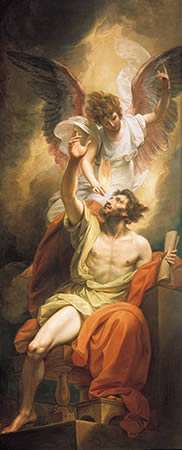
Haftarah
The haftarah for the parashah is Isaiah 6:1–7:6 and 9:5–6.
Connection to the Parashah
Both the parashah and the haftarah recount God's revelation. Both the parashah and the haftarah describe Divine Beings as winged.[120] Both the parashah and the haftarah report God's presence accompanied by shaking and smoke.[121] And both the parashah and the haftarah speak of making Israel a holy community.[122]
Notes
- ↑ "Torah Stats — Shemoth". Akhlah Inc. Retrieved July 6, 2013.
- ↑ "Parashat Yitro". Hebcal. Retrieved January 26, 2015.
- ↑ See, e.g., The Schottenstein Edition Interlinear Chumash: Shemos/Exodus. Edited by Menachem Davis, pages 120–44. Brooklyn: Mesorah Publications, 2008. ISBN 1-4226-0204-4.
- ↑ Exodus 18:1–5.
- ↑ Exodus 18:9–12.
- ↑ Exodus 18:13.
- ↑ Exodus 18:14–23.
- ↑ Exodus 18:24.
- ↑ Exodus 18:27.
- ↑ Exodus 19:1–2.
- ↑ Exodus 19:3–6.
- ↑ Exodus 19:7–8.
- ↑ Exodus 19:10–11.
- ↑ Exodus 19:12–15.
- ↑ Exodus 19:16.
- ↑ Exodus 19:17.
- ↑ Exodus 19:18–19.
- ↑ Exodus 19:20.
- ↑ Exodus 19:21.
- 1 2 Exodus 20:2.
- ↑ Exodus 20:2–5 (20:3–6 in the NJPS). A note on verse numbering: The Mechon Mamre Hebrew-English Bible to which articles in this series link numbers its verses according to the Lower Trope Marks system, in which the verses are numbered naturally in their form for study. Many Jewish Bibles in both Hebrew and English (including the 1917 Jewish Publication Society Holy Scriptures According to the Masoretic Text, the New Jewish Publication Society Tanakh, and the ArtScroll Chumash) use the numbering of the Upper Trope Marks system as used for public readings. Parallel verse numbering thus appears for the Ten Commandments here in Exodus 20, as well as in Deuteronomy 5.
- 1 2 Exodus 20:6 (20:7 in the NJPS).
- ↑ Exodus 20:7–10 (20:8–11 in the NJPS).
- 1 2 Exodus 20:11 (20:12 in the NJPS).
- 1 2 3 4 5 Exodus 20:12 (20:13 in the NJPS).
- 1 2 Exodus 20:13 (20:14 in the NJPS).
- ↑ Exodus 20:14–15 (20:15–16 in the NJPS).
- ↑ Exodus 20:16–20 (20:17–21 in the NJPS).
- 1 2 Exodus 20:21 (20:22 in the NJPS).
- 1 2 Exodus 20:22 (20:23 in the NJPS).
- ↑ See, e.g., "A Complete Triennial Cycle for Reading the Torah" (PDF). The Jewish Theological Seminary. Retrieved June 16, 2014.
- ↑ Instructions of Shuruppak. Sumer, early 3rd millennium BCE. Reprinted in, e.g., Bendt Alster. Wisdom of Ancient Sumer, pages 60–69. Capital Decisions Ltd, 2005. ISBN 1883053927. And reprinted in Bruce Wells. “Exodus.” In Zondervan Illustrated Bible Backgrounds Commentary. Edited by John H. Walton, volume 1, page 227. Grand Rapids, Michigan: Zondervan, 2009. ISBN 978-0-310-25573-4.
- ↑ For more on classical rabbinic interpretation, see, e.g., Yaakov Elman. “Classical Rabbinic Interpretation.” In The Jewish Study Bible: Second Edition. Edited by Adele Berlin and Marc Zvi Brettler, pages 1859–78. New York: Oxford University Press, 2014. ISBN 978-0-19-997846-5.
- ↑ Babylonian Talmud Zevachim 116a. Babylonia, 6th century. Reprinted in, e.g., Talmud Bavli. Elucidated by Israel Schneider, Yosef Widroff, Mendy Wachsman, Dovid Katz, Zev Meisels, and Feivel Wahl; edited by Yisroel Simcha Schorr and Chaim Malinowitz, volume 57, page 116a4. Brooklyn: Mesorah Publications, 1996. ISBN 1-57819-615-9. See also Mekhilta of Rabbi Ishmael, Amalek, chapter 3. Land of Israel, late 4th century. Reprinted in, e.g., Mekhilta de-Rabbi Ishmael. Translated by Jacob Z. Lauterbach, volume 2, pages 271–72. Philadelphia: Jewish Publication Society, 1933, reissued 2004. ISBN 0-8276-0678-8.
- ↑ Exodus Rabbah 17:2. 10th century. Reprinted in, e.g., Midrash Rabbah: Exodus. Translated by Simon M. Lehrman, volume 3, page 322. London: Soncino Press, 1939. ISBN 0-900689-38-2.
- ↑ Mekhilta of Rabbi Ishmael, Amelek, chapter 3. Reprinted in, e.g., Mekhilta de-Rabbi Ishmael. Translated by Jacob Z. Lauterbach, volume 2, page 279.
- ↑ Deuteronomy Rabbah 1:10. Land of Israel, 9th century. Reprinted in, e.g., Midrash Rabbah: Deuteronomy. Translated by Harry Freedman and Maurice Simon, volume 7, pages 8–9. London: Soncino Press, 1939. ISBN 0-900689-38-2.
- ↑ Mekhilta of Rabbi Ishmael, Bahodesh, chapter 1, 47:3:1. Reprinted in, e.g., Mekhilta According to Rabbi Ishmael. Translated by Jacob Neusner, volume 2, page 45. Atlanta: Scholars Press, 1988. ISBN 1-55540-237-2. And Mekhilta de-Rabbi Ishmael. Translated by Jacob Z. Lauterbach, volume 2, page 295.
- ↑ Deuteronomy Rabbah 10:2. Reprinted in, e.g., Midrash Rabbah: Deuteronomy. Translated by Harry Freedman and Maurice Simon, volume 7, page 165.
- ↑ Mekhilta of Rabbi Ishmael, Bahodesh, chapter 2. Reprinted in, e.g., Mekhilta de-Rabbi Ishmael. Translated by Jacob Z. Lauterbach, volume 2, page 296.
- ↑ Mekhilta of Rabbi Ishmael, Pisha, chapter 14. Reprinted in, e.g., Mekhilta de-Rabbi Ishmael. Translated by Jacob Z. Lauterbach, volume 1, page 74.
- ↑ Mekhilta of Rabbi Ishmael, Bahodesh, chapter 2. Reprinted in, e.g., Mekhilta de-Rabbi Ishmael. Translated by Jacob Z. Lauterbach, volume 2, page 296–97.
- ↑ Exodus Rabbah 20:11. Reprinted in, e.g., Midrash Rabbah: Exodus. Translated by Simon M. Lehrman, volume 3, page 252. See also Exodus Rabbah 25:6. Reprinted in, e.g., Midrash Rabbah: Exodus. Translated by Simon M. Lehrman, volume 3, pages 306–07.
- ↑ See Mishnah Bava Batra 10:4. Reprinted in, e.g., The Mishnah: A New Translation. Translated by Jacob Neusner, page 580. Babylonian Talmud Bava Batra 167b. See also Babylonian Talmud Ketubot 102b. Reprinted in, e.g., Koren Talmud Bavli: Ketubot: Part Two. Commentary by Adin Even-Israel (Steinsaltz), volume 17, page 229. Jerusalem: Koren Publishers, 2015. ISBN 978-965-301-578-4. Babylonian Talmud Kiddushin 9b.
- ↑ Deuteronomy Rabbah 3:12. Reprinted in, e.g., Midrash Rabbah: Deuteronomy. Translated by Harry Freedman and Maurice Simon, volume 7, page 81.
- ↑ Mishnah Bava Kamma 5:7. Land of Israel, circa 200 CE. Reprinted in, e.g., The Mishnah: A New Translation. Translated by Jacob Neusner. New Haven: Yale University Press, 1988. ISBN 0-300-05022-4.
- ↑ Babylonian Talmud Shabbat 87a. Reprinted in, e.g., Koren Talmud Bavli: Shabbat · Part Two. Commentary by Adin Even-Israel (Steinsaltz), volume 3, page 27. Jerusalem: Koren Publishers, 2012. ISBN 978-965-301-565-4.
- ↑ Mishnah Shabbat 9:3. Reprinted in, e.g., The Mishnah: A New Translation. Translated by Jacob Neusner. Babylonian Talmud Shabbat 86a. Reprinted in, e.g., Koren Talmud Bavli: Shabbat · Part Two. Commentary by Adin Even-Israel (Steinsaltz), volume 3, page 23.
- 1 2 Genesis Rabbah 68:12. Land of Israel, 5th century. Reprinted in, e.g., Midrash Rabbah: Genesis. Translated by Harry Freedman and Maurice Simon, volume 2, pages 624–25. London: Soncino Press, 1939. ISBN 0-900689-38-2.
- ↑ Exodus Rabbah 29:1. Reprinted in, e.g., Midrash Rabbah: Exodus. Translated by Simon M. Lehrman, volume 3, page 337.
- ↑ Mekhilta of Rabbi Ishmael, Bahodesh, chapter 4, 50:1:11–12. Reprinted in, e.g., Mekhilta According to Rabbi Ishmael. Translated by Jacob Neusner, volume 2, pages 61–62. And Mekhilta de-Rabbi Ishmael. Translated by Jacob Z. Lauterbach, volume 2, pages 309–10.
- ↑ Babylonian Talmud Shabbat 88b–89a. Reprinted in, e.g., Koren Talmud Bavli: Shabbat · Part Two. Commentary by Adin Even-Israel (Steinsaltz), volume 3, pages 34–35
- ↑ Pirke De-Rabbi Eliezer, chapter 41. Early 9th century. Reprinted in, e.g., Pirke de Rabbi Eliezer. Translated and annotated by Gerald Friedlander, pages 318–20. London, 1916. Reprinted New York: Hermon Press, 1970. ISBN 0-87203-183-7.
- ↑ Babylonian Talmud Shabbat 88b. Reprinted in, e.g., Koren Talmud Bavli: Shabbat · Part Two. Commentary by Adin Even-Israel (Steinsaltz), volume 3, page 34.
- ↑ Exodus Rabbah 29:9. Reprinted in, e.g., Midrash Rabbah: Exodus. Translated by Simon M. Lehrman, volume 3, page 344.
- ↑ Exodus Rabbah 29:1. Reprinted in, e.g., Midrash Rabbah: Exodus. Translated by Simon M. Lehrman, volume 3, page 337.
- ↑ Exodus Rabbah 29:3. Reprinted in, e.g., Midrash Rabbah: Exodus. Translated by Simon M. Lehrman, volume 3, page 338.
- ↑ Leviticus Rabbah 24:5. Land of Israel, 5th century. Reprinted in, e.g., Midrash Rabbah: Leviticus. Translated by Harry Freedman and Maurice Simon, volume 4, pages 307–08. London: Soncino Press, 1939. ISBN 0-900689-38-2.
- ↑ Mishnah Tamid 5:1. Reprinted in, e.g., The Mishnah: A New Translation. Translated by Jacob Neusner. Babylonian Talmud Tamid 32b.
- ↑ Babylonian Talmud Berakhot 12a. Reprinted in, e.g., Koren Talmud Bavli: Berakhot. Commentary by Adin Even-Israel (Steinsaltz), volume 1, pages 76–77. Jerusalem: Koren Publishers, 2012. ISBN 978-965-301-5630.
- ↑ Sifre to Numbers 112:4:3. Land of Israel, circa 250–350 CE. Reprinted in, e.g., Sifré to Numbers: An American Translation and Explanation. Translated by Jacob Neusner, volume 2, page 170. Atlanta: Scholars Press, 1986. ISBN 1-55540-010-8.
- ↑ Babylonian Talmud Makkot 23b–24a.
- ↑ Sifre to Numbers 111:1:3. Reprinted in, e.g., Sifré to Numbers: An American Translation and Explanation. Translated by Jacob Neusner, volume 2.
- ↑ Mishnah Avodah Zarah 1:1–5:12. Reprinted in, e.g., The Mishnah: A New Translation. Translated by Jacob Neusner. Tosefta Avodah Zarah 1:1–8:8. Land of Israel, circa 300 CE. Reprinted in, e.g., The Tosefta: Translated from the Hebrew, with a New Introduction. Translated by Jacob Neusner. Peabody, Massachusetts: Hendrickson Publishers, 2002. ISBN 1-56563-642-2. Jerusalem Talmud Avodah Zarah 1a–. Land of Israel, circa 400 CE. Reprinted in, e.g., The Jerusalem Talmud: A Translation and Commentary. Edited by Jacob Neusner and translated by Jacob Neusner, Tzvee Zahavy, B. Barry Levy, and Edward Goldman. Peabody, Massachusetts: Hendrickson Publishers, 2009. ISBN 978-1-59856-528-7. Babylonian Talmud Avodah Zarah 2a–76b.
- ↑ Mishnah Sanhedrin 7:6. Reprinted in, e.g., The Mishnah: A New Translation. Translated by Jacob Neusner. Babylonian Talmud Sanhedrin 60b.
- ↑ Babylonian Talmud Sanhedrin 27b.
- ↑ Mishnah Nedarim 1:1–11:11. Reprinted in, e.g., The Mishnah: A New Translation. Translated by Jacob Neusner, pages 406–30. Tosefta Nedarim 1:1–7:8. Reprinted in, e.g., The Tosefta: Translated from the Hebrew, with a New Introduction. Translated by Jacob Neusner, volume 1, pages 785–805. Jerusalem Talmud Nedarim 1a–. Reprinted in, e.g., The Jerusalem Talmud: A Translation and Commentary. Edited by Jacob Neusner and translated by Jacob Neusner, Tzvee Zahavy, B. Barry Levy, and Edward Goldman. Babylonian Talmud Nedarim 2a–91b. Babylonia, 6th century. Reprinted in, e.g., Talmud Bavli. Edited by Yisroel Simcha Schorr and Chaim Malinowitz, volumes 29–30. Brooklyn: Mesorah Publications, 2000. Mishnah Shevuot 1:1–8:6. Reprinted in, e.g., The Mishnah: A New Translation. Translated by Jacob Neusner, pages 620–39. Tosefta Shevuot 1:1–6:7. Reprinted in, e.g., The Tosefta: Translated from the Hebrew, with a New Introduction. Translated by Jacob Neusner, volume 2, pages 1219–44. Jerusalem Talmud Shevuot 1a–. Edited by Jacob Neusner and translated by Jacob Neusner, Tzvee Zahavy, B. Barry Levy, and Edward Goldman. Babylonian Talmud Shevuot 2a–49b. Reprinted in, e.g., Talmud Bavli. Elucidated by Michoel Weiner and Mordechai Kuber; edited by Yisroel Simcha Schorr, volume 51. Brooklyn: Mesorah Publications, 1994. ISBN 1-57819-607-8.
- ↑ Mishnah Shabbat 1:1–24:5. Reprinted in, e.g., The Mishnah: A New Translation. Translated by Jacob Neusner, pages 179–208. Tosefta Shabbat 1:1–17:29. Reprinted in, e.g., The Tosefta: Translated from the Hebrew, with a New Introduction. Translated by Jacob Neusner, volume 1, pages 357–427. Jerusalem Talmud Shabbat 1a–113b. Reprinted in, e.g., Talmud Yerushalmi. Elucidated by Yehuda Jaffa, Gershon Hoffman, Mordechai Smilowitz, Abba Zvi Naiman, Chaim Ochs, and Mendy Wachsman; edited by Chaim Malinowitz, Yisroel Simcha Schorr, and Mordechai Marcus, volumes 13–15. Brooklyn: Mesorah Publications, 2013. Babylonian Talmud Shabbat 2a–157b. Reprinted in, e.g., Koren Talmud Bavli: Tractate Shabbat. Commentary by Adin Even-Israel (Steinsaltz), volumes 2–3. Jerusalem: Koren Publishers, 2012.
- ↑ Mishnah Shabbat 5:1. Reprinted in, e.g., The Mishnah: A New Translation. Translated by Jacob Neusner. Babylonian Talmud Shabbat 51b. Reprinted in, e.g., Koren Talmud Bavli: Shabbat · Part One. Commentary by Adin Even-Israel (Steinsaltz), volume 2. Jerusalem: Koren Publishers, 2012. ISBN 978-965-301-564-7.
- ↑ Mishnah Shabbat 5:2. Reprinted in, e.g., The Mishnah: A New Translation. Translated by Jacob Neusner. Babylonian Talmud Shabbat 52b.
- ↑ Mishnah Shabbat 5:3. Reprinted in, e.g., The Mishnah: A New Translation. Translated by Jacob Neusner. Babylonian Talmud Shabbat 54a.
- ↑ Mishnah Shabbat 5:4. Reprinted in, e.g., The Mishnah: A New Translation. Translated by Jacob Neusner. Babylonian Talmud Shabbat 54b.
- ↑ Exodus Rabbah 19:4. Reprinted in, e.g., Midrash Rabbah: Exodus. Translated by Simon M. Lehrman, volume 3, page 232.
- ↑ Mishnah Beitzah 5:2. Reprinted in, e.g., The Mishnah: A New Translation. Translated by Jacob Neusner. Babylonian Talmud Beitzah 36b. See also Mishnah Megillah 1:5. Reprinted in, e.g., The Mishnah: A New Translation. Translated by Jacob Neusner. Babylonian Talmud Megillah 7b.
- ↑ Tanna Devei Eliyahu. Seder Eliyyahu Rabbah, chapter (26) 24, page 130. 10th century. Reprinted in, e.g., Tanna Debe Eliyyahu: The Lore of the School of Elijah. Translated by William G. Braude and Israel J. Kapstein, page 283. Philadelphia: Jewish Publication Society, 1981. ISBN 0-8276-0634-6.
- ↑ Mishnah Kiddushin 1:7. Reprinted in, e.g., The Mishnah: A New Translation. Translated by Jacob Neusner. Babylonian Talmud Kiddushin 29a, 30b.
- ↑ Babylonian Talmud Kiddushin 30b.
- ↑ Genesis Rabbah 1:15. Reprinted in, e.g., Midrash Rabbah: Genesis. Translated by Harry Freedman and Maurice Simon, volume 1, pages 13–14.
- 1 2 Babylonian Talmud Kiddushin 30b–31a.
- ↑ Babylonian Talmud Kiddushin 31b.
- ↑ Mishnah Sanhedrin 9:1–5. Reprinted in, e.g., The Mishnah: A New Translation. Translated by Jacob Neusner, pages 602–04. Babylonian Talmud Sanhedrin 76b–81b. Reprinted in, e.g., Talmud Bavli. Elucidated by Michoel Weiner and Asher Dicker; edited by Yisroel Simcha Schorr and Chaim Malinowitz, volume 48, page 76b2–81b3.
- ↑ Mishnah Sanhedrin 9:2. Reprinted in, e.g., The Mishnah: A New Translation. Translated by Jacob Neusner, pages 602–03. Babylonian Talmud Sanhedrin 78b–79a. Reprinted in, e.g., Talmud Bavli. Elucidated by Michoel Weiner and Asher Dicker; edited by Yisroel Simcha Schorr and Chaim Malinowitz, volume 48, page 78b3–79a1.
- ↑ Mishnah Sanhedrin 4:5. Reprinted in, e.g., The Mishnah: A New Translation. Translated by Jacob Neusner, page 591. Babylonian Talmud Sanhedrin 37a. Reprinted in, e.g., Talmud Bavli. Elucidated by Asher Dicker and Abba Zvi Naiman; edited by Hersh Goldwurm, volume 47, page 37a3.
- ↑ Tanna Devei Eliyahu. Seder Eliyyahu Rabbah, chapter (26) 24, page 131. Reprinted in, e.g., Tanna Debe Eliyyahu: The Lore of the School of Elijah. Translated by William G. Braude and Israel J. Kapstein, page 283.
- ↑ Babylonian Talmud Talmud Sanhedrin 86a. Reprinted in, e.g., Talmud Bavli. Elucidated by Asher Dicker, Joseph Elias, and Dovid Katz; edited by Yisroel Simcha Schorr and Chaim Malinowitz, volume 49, page 86a3. Brooklyn: Mesorah Publications, 1995. ISBN 1-57819-628-0. See also Mekhilta of Rabbi Ishmael, Bahodesh, chapter 8. Reprinted in, e.g., Mekhilta de-Rabbi Ishmael. Translated by Jacob Z. Lauterbach, volume 2, page 334.
- ↑ Mishnah Makkot 1:3. Reprinted in, e.g., The Mishnah: A New Translation. Translated by Jacob Neusner. Babylonian Talmud Makkot 4a.
- ↑ Jerusalem Talmud Terumot 64a. Reprinted in, e.g., The Jerusalem Talmud: A Translation and Commentary. Edited by Jacob Neusner and translated by Jacob Neusner, Tzvee Zahavy, B. Barry Levy, and Edward Goldman.
- ↑ Babylonian Talmud Bava Metzia 5b. Reprinted in, e.g., Talmud Bavli. Edited by Hersh Goldwurm, volume 41, page 5b3. Brooklyn: Mesorah Publications, 1992. ISBN 1-57819-637-X.
- ↑ Mekhilta of Rabbi Ishmael, Bahodesh, chapter 8. Reprinted in, e.g., Mekhilta de-Rabbi Ishmael. Translated by Jacob Z. Lauterbach, volume 2, page 337.
- ↑ Mekhilta of Rabbi Simeon, Tractate Bahodesh, chapter 55. Land of Israel, 5th century. Reprinted in, e.g., Mekhilta de-Rabbi Shimon bar Yohai. Translated by W. David Nelson, page 251. Philadelphia: Jewish Publication Society, 2006. ISBN 0-8276-0799-7.
- ↑ Mekhilta of Rabbi Ishmael, Bahodesh, chapter 9, 55:1:1. Reprinted in, e.g., Mekhilta According to Rabbi Ishmael. Translated by Jacob Neusner, volume 2, page 89. Atlanta: Scholars Press, 1988. ISBN 1-55540-237-2. And Mekhilta de-Rabbi Ishmael. Translated by Jacob Z. Lauterbach, volume 2, page 338.
- ↑ Babylonian Talmud Yevamot 79a.
- ↑ Leviticus Rabbah 15:7. Reprinted in, e.g., Midrash Rabbah: Leviticus. Translated by Harry Freedman and Maurice Simon, volume 4, pages 194–95.
- ↑ Mishnah Avot 3:6. Reprinted in, e.g., The Mishnah: A New Translation. Translated by Jacob Neusner.
- ↑ Genesis Rabbah 48:4. Reprinted in, e.g., Midrash Rabbah: Genesis. Translated by Harry Freedman and Maurice Simon, volume 1, page 407.
- ↑ For more on medieval Jewish interpretation, see, e.g., Barry D. Walfish. “Medieval Jewish Interpretation.” In The Jewish Study Bible: Second Edition. Edited by Adele Berlin and Marc Zvi Brettler, pages 1891–1915.
- ↑ Maimonides, Mishneh Torah, Sefer Mezikin, Hilkhot Gezelah va-Avedah, chapter 1, halachot 9–12. Egypt. Circa 1170–1180. Reprinted in, e.g., Mishneh Torah: Sefer Mezikin . Translated by Eliyahu Touger, pages 238–40. New York: Moznaim, Publishing, 1997. ISBN 1-885220-18-9.
- ↑ Isaac Abrabanel. Commentary on the Torah. Quoted in Judah Zoldan. "Is Marketing Coveting? (August 13, 2011).
- ↑ Maimonides. The Guide for the Perplexed, part 3, chapter 32. Cairo, Egypt, 1190. Reprinted in, e.g., Moses Maimonides. The Guide for the Perplexed. Translated by Michael Friedländer, pages 322–27. New York: Dover Publications, 1956. ISBN 0-486-20351-4.
- ↑ E.g., Umberto Cassuto. A Commentary on the Book of Exodus. Jerusalem, 1951. Translated by Israel Abrahams, page 241. Jerusalem: The Magnes Press, The Hebrew University, 1967. Nahum M. Sarna. The JPS Torah Commentary: Exodus: The Traditional Hebrew Text with the New JPS Translation, page 109. Philadelphia: Jewish Publication Society, 1991. ISBN 0-8276-0327-4. (“royal, self-identifying formula”). Richard Elliott Friedman. Commentary on the Torah: With a New English Translation, page 235. New York: Harper San Francisco, 2001. ISBN 0-06-062561-9. (“introductory statement”). Robert Alter. The Five Books of Moses: A Translation with Commentary, page 429. New York: W.W. Norton & Co., 2004. ISBN 0-393-01955-1. (“formal announcement of the identity of the sovereign whose authority underwrites what is to follow”). W. Gunther Plaut. The Torah: A Modern Commentary: Revised Edition. Revised edition edited by David E.S. Stern, page 477. New York: Union for Reform Judaism, 2006. ISBN 0-8074-0883-2. (“preamble — yet more than preamble”). Jeffrey H. Tigay. “Exodus.” In The Jewish Study Bible. Edited by Adele Berlin and Marc Zvi Brettler, page 139. (“an introduction”).
- ↑ Sefer HaHinnuch: The Book of [Mitzvah] Education. Translated by Charles Wengrov, volume 1, pages 141–97. Jerusalem: Feldheim Publishers, 1991. ISBN 0-87306-179-9.
- ↑ Exodus 20:2 (20:3 in the NJPS).
- ↑ Exodus 20:3 (20:4 in the NJPS)
- 1 2 Exodus 20:4 (20:5 in the NJPS).
- ↑ Exodus 20:7 (20:8 in the NJPS).
- ↑ Exodus 20:9 (20:10 in the NJPS).
- ↑ Exodus 20:19 (20:20 in the NJPS)
- ↑ Reuven Hammer. Or Hadash: A Commentary on Siddur Sim Shalom for Shabbat and Festivals, 29. New York: The Rabbinical Assembly, 2003. ISBN 0-916219-20-8.
- ↑ Hammer, page 17.
- ↑ Mishnah Tamid 5:1. Reprinted in, e.g., The Mishnah: A New Translation. Translated by Jacob Neusner.
- ↑ Reuven Hammer. Entering Jewish Prayer: A Guide to Personal Devotion and the Worship Service, 76–82. New York: Schocken, 1995. ISBN 0-8052-1022-9.
- ↑ Hammer, Or Hadash, page 21.
- ↑ Genesis Rabbah 11:9. Reprinted in, e.g., Midrash Rabbah: Genesis. Translated by Harry Freedman and Maurice Simon, volume 1, page 86.
- ↑ Hammer, Or Hadash, page 26.
- ↑ Menachem Davis. The Schottenstein Edition Siddur for the Sabbath and Festivals with an Interlinear Translation, 458–59. Brooklyn: Mesorah Publications, 2002. ISBN 1-57819-697-3.
- ↑ Davis, page 466.
- ↑ Davis, pages 466–67.
- ↑ Davis, page 549.
- ↑ See Mark L. Kligman. "The Bible, Prayer, and Maqam: Extra-Musical Associations of Syrian Jews." Ethnomusicology, volume 45 (number 3) (Autumn 2001): pages 443–479. Mark L. Kligman. Maqam and Liturgy: Ritual, Music, and Aesthetics of Syrian Jews in Brooklyn. Detroit: Wayne State University Press, 2009. ISBN 0814332161.
- ↑ Exodus 19:4; Isaiah 6:2.
- ↑ Exodus 19:18; Isaiah 6:4.
- ↑ Exodus 19:6; Isaiah 6:13.
Further reading
The parashah has parallels or is discussed in these sources:
Ancient
- Instructions of Shuruppak. Sumer, early 3rd millennium BCE. Reprinted in, e.g., Bendt Alster. Wisdom of Ancient Sumer, pages 60–69. Capital Decisions Ltd, 2005. ISBN 1883053927. (analog to Ten Commandments).
- Book of the Dead, chapter 125. Ancient Egypt, 1500–1400 BCE. Reprinted in, e.g., E. A. Wallis Budge. The Egyptian Book of the Dead (The Papyrus of Ani) Egyptian Text, Transliteration and Translation, pages 195–205. New York: Dover Publications, 1967. (analog to Ten Commandments).
Biblical
- Exodus 34:7 (punishing children for fathers' sin).
- Leviticus 5:1–10 (vows); 19:12 (vows).
- Numbers 14:18 (punishing children for fathers' sin); 30:2–17 (vows).
- Deuteronomy 1:9–18 (sharing administrative duties); 5:2–28 (ten commandments); 5:8 (5:9 in the NJPS) (punishing children for fathers' sin); 23:22–24 (vows); 24:16 (no capital punishment of children for fathers' sin).
- Isaiah 56:6–7 (keeping the Sabbath); 66:23 (universally observed Sabbath).
- Jeremiah 31:28–29 (31:29–30 in the NJPS) (not punishing children for fathers' sin).
- Ezekiel 18:1–4 (not punishing children for fathers' sin); 18:5–7 (the just does not rob).
- Psalm 97:7 (graven images).
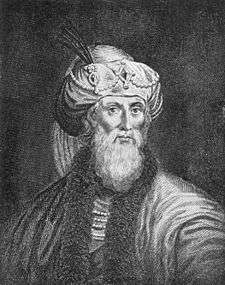
Early nonrabbinic
- Josephus. Antiquities of the Jews. 3:3:1 – 3:5:6. Circa 93–94. Reprinted in, e.g., The Works of Josephus: Complete and Unabridged, New Updated Edition. Translated by William Whiston, pages 83–85. Peabody, Massachusetts: Hendrickson Publishers, 1987. ISBN 0-913573-86-8.
Classical rabbinic
- Mishnah: Shabbat 5:1–4, 9:3; Nedarim 1:1–11:11; Bava Kamma 5:7; Sanhedrin 7:6; Makkot 1:3; Shevuot 1:1–8:6; Avodah Zarah 1:1–5:12; Avot 3:6, 5:6; Tamid 5:1. Land of Israel, circa 200 CE. Reprinted in, e.g., The Mishnah: A New Translation. Translated by Jacob Neusner, pages 184, 190, 515, 598, 610, 660–72, 679, 686, 869. New Haven: Yale University Press, 1988. ISBN 0-300-05022-4.
- Tosefta: Maaser Sheni 5:27; Shabbat 1:21; Sukkah 4:3; Megillah 3:5, 24; Sotah 4:1, 7:2; Bava Kamma 3:2–3, 4:6, 6:4, 14, 7:5, 9:7, 17, 20, 22, 26; Sanhedrin 3:2, 4:7, 12:3; Makkot 1:7; Shevuot 3:6, 8; Avodah Zarah 1:1–8:8; Arakhin 2:10, 5:9. Land of Israel, circa 300 CE. Reprinted in, e.g., The Tosefta: Translated from the Hebrew, with a New Introduction. Translated by Jacob Neusner, volume 1, pages 330, 360, 579, 645, 650, 844, 860; volume 2, pages 962–63, 972, 978, 980, 987, 1001, 1004–06, 1150, 1159, 1185, 1201, 1232–34, 1261–93, 1499, 1514. Peabody, Massachusetts: Hendrickson Publishers, 2002. ISBN 1-56563-642-2.
- Jerusalem Talmud: Berakhot 5a, 12b–13a, 39a, 50b, 87a; Peah 6b; Sheviit 1a, 2a; Terumot 64a; Bikkurim 23b; Shabbat 1a–113b; Eruvin 33b; Sukkah 3a, 24a; Rosh Hashanah 1b; Taanit 16b; Megillah 18b, 31b; Ketubot 19a, 27a; Nedarim 1a–; Sanhedrin 2a, 11b, 21a, 27a, 34b, 36a; Shevuot 1a–; Avodah Zarah 1a–. Land of Israel, circa 400 CE. Reprinted in, e.g., Talmud Yerushalmi. Edited by Chaim Malinowitz, Yisroel Simcha Schorr, and Mordechai Marcus, volumes 1–3, 6a, 8, 12–15, 17, 22, 24–26, 31. Brooklyn: Mesorah Publications, 2005–2015. And reprinted in, e.g., The Jerusalem Talmud: A Translation and Commentary. Edited by Jacob Neusner and translated by Jacob Neusner, Tzvee Zahavy, B. Barry Levy, and Edward Goldman. Peabody, Massachusetts: Hendrickson Publishers, 2009. ISBN 978-1-59856-528-7.
- Mekhilta of Rabbi Ishmael 47:1–57:1. Land of Israel, late 4th century. Reprinted in, e.g., Mekhilta According to Rabbi Ishmael. Translated by Jacob Neusner, volume 2, pages 37–103. Atlanta: Scholars Press, 1988. ISBN 1-55540-237-2. And Mekhilta de-Rabbi Ishmael. Translated by Jacob Z. Lauterbach, volume 2, pages 271–354. Philadelphia: Jewish Publication Society, 1933, reissued 2004. ISBN 0-8276-0678-8.
- Mekhilta of Rabbi Simeon 20:3; 26:1; 34:2; 44:1–2; 46:1–57:3; 68:1–2; 74:4, 6; 77:4; 78:4; 82:1. Land of Israel, 5th century. Reprinted in, e.g., Mekhilta de-Rabbi Shimon bar Yohai. Translated by W. David Nelson, pages 83–84, 113, 147, 186, 195–209, 212–58, 305, 347, 349, 359, 364, 372–73. Philadelphia: Jewish Publication Society, 2006. ISBN 0-8276-0799-7.
.jpg)
- Babylonian Talmud: Berakhot 6a–b, 20b, 33a, 45a, 54a, 57a, 64a; Shabbat 10a, 33b, 51b, 86a–b, 87b–88b, 94a, 105a, 114b, 117b, 120a–b, 153a–b; Pesachim 5b, 47b–48a, 54a, 63b, 106a, 117b; Yoma 4a, 86a; Sukkah 5a, 53a; Beitzah 5a–b, 15b; Rosh Hashanah 3a, 24a–b, 27a; Taanit 21b; Megillah 31a; Moed Katan 5a, 7b, 13a, 15a; Chagigah 3b, 6a, 12b–13a, 14a, 18a, 27a; Yevamot 46b, 62a, 79a; Ketubot 103a, 111a; Nedarim 18a, 20a, 38a; Nazir 45a; Sotah 31a, 33a, 38a, 42a; Gittin 57b; Kiddushin 2b, 30a–32a, 76b; Bava Kamma 54b, 74b, 99b; Bava Metzia 5b, 30b, 32a, 61b; Sanhedrin 2b, 7a–b, 10a, 15b–17a, 18a–b, 21b, 34b, 35b, 36b, 45a, 50a, 56b, 59b, 61a–62a, 63a, 67a, 86a–b, 94a, 99a; Makkot 2b, 4a–b, 7b, 8b, 10a, 13b; Shevuot 20b–21a, 29a, 30b–31a, 39a, 47b; Avodah Zarah 2a–76b; Horayot 4b, 8a; Zevachim 8a, 19a, 58a, 59a, 61b, 115b–16a; Menachot 5b; Chullin 110b; Arakhin 11a; Temurah 3a–b; Keritot 3b; Niddah 13b, 42a. Babylonia, 6th century. Reprinted in, e.g., Talmud Bavli. Edited by Yisroel Simcha Schorr, Chaim Malinowitz, and Mordechai Marcus, 72 volumes. Brooklyn: Mesorah Publications, 2006.
Medieval
- Saadia Gaon. The Book of Beliefs and Opinions, Introduction 6; 2:12; 5:4, 6; 6:6; 9:2; 10:11. Baghdad, Babylonia, 933. Translated by Samuel Rosenblatt, pages 31–32, 128, 130, 219–20, 225–26, 254, 327–28, 385. New Haven: Yale Univ. Press, 1948. ISBN 0-300-04490-9.
- Exodus Rabbah 27:1–29:9. 10th century. Reprinted in, e.g., Midrash Rabbah: Exodus. Translated by S. M. Lehrman, volume 3, pages 321–45. London: Soncino Press, 1939. ISBN 0-900689-38-2.
- Solomon ibn Gabirol. A Crown for the King, 29:357–58. Spain, 11th century. Translated by David R. Slavitt, pages 48–49. New York: Oxford University Press, 1998. ISBN 0-19-511962-2.

- Rashi. Commentary. Exodus 18–20. Troyes, France, late 11th century. Reprinted in, e.g., Rashi. The Torah: With Rashi's Commentary Translated, Annotated, and Elucidated. Translated and annotated by Yisrael Isser Zvi Herczeg, volume 2, pages 205–46. Brooklyn: Mesorah Publications, 1994. ISBN 0-89906-027-7.
- Rashbam. Commentary on the Torah. Troyes, early 12th century. Reprinted in, e.g., Rashbam's Commentary on Exodus: An Annotated Translation. Edited and translated by Martin I. Lockshin, pages 189–223. Atlanta: Scholars Press, 1997. ISBN 0-7885-0225-5.
- Judah Halevi. Kuzari. 1:87–91; 2:4; 3:39; 5:21. Toledo, Spain, 1130–1140. Reprinted in, e.g., Jehuda Halevi. Kuzari: An Argument for the Faith of Israel. Introduction by Henry Slonimsky, pages 60–63, 87, 172, 290. New York: Schocken, 1964. ISBN 0-8052-0075-4.
- Abraham ibn Ezra. Commentary on the Torah. France, 1153. Reprinted in, e.g., Ibn Ezra's Commentary on the Pentateuch: Exodus (Shemot). Translated and annotated by H. Norman Strickman and Arthur M. Silver, volume 2, pages 342–446. New York: Menorah Publishing Company, 1996. ISBN 0-932232-08-6.
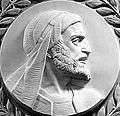
- Maimonides. Mishneh Torah, Sefer Mezikin, Hilkhot Gezelah va-Avedah, chapter 1, halachot 9–12. Egypt, circa 1170–1180. Reprinted in, e.g., Mishneh Torah: Sefer Mezikin . Translated by Eliyahu Touger, pages 238–40. New York: Moznaim, Publishing, 1997. ISBN 1-885220-18-9.
- Maimonides. The Guide for the Perplexed. Cairo, Egypt, 1190. Reprinted in, e.g., Moses Maimonides. The Guide for the Perplexed. Translated by Michael Friedländer, pages 19, 23, 25, 32, 36, 60, 77, 96–97, 219, 221–23, 264, 305, 322–23, 327, 346, 352. New York: Dover Publications, 1956. ISBN 0-486-20351-4.
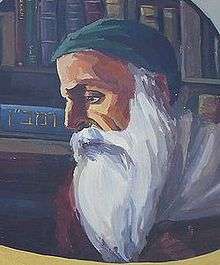
- Hezekiah ben Manoah. Hizkuni. France, circa 1240. Reprinted in, e.g., Chizkiyahu ben Manoach. Chizkuni: Torah Commentary. Translated and annotated by Eliyahu Munk, volume 2, pages 477A–516. Jerusalem: Ktav Publishers, 2013. ISBN 978-1-60280-261-2.
- Nachmanides. Commentary on the Torah. Jerusalem, circa 1270. Reprinted in, e.g., Ramban (Nachmanides): Commentary on the Torah. Translated by Charles B. Chavel, volume 2, pages 249–337. New York: Shilo Publishing House, 1973. ISBN 0-88328-007-8.
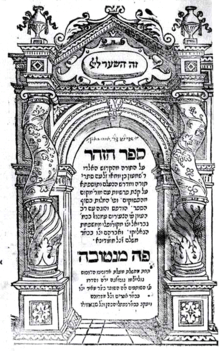
- Zohar 2:67a–94a. Spain, late 13th century. Reprinted in, e.g., The Zohar. Translated by Harry Sperling and Maurice Simon. 5 volumes. London: Soncino Press, 1934.
- Bahya ben Asher. Commentary on the Torah. Spain, early 14th century. Reprinted in, e.g., Midrash Rabbeinu Bachya: Torah Commentary by Rabbi Bachya ben Asher. Translated and annotated by Eliyahu Munk, volume 3, pages 1022–121. Jerusalem: Lambda Publishers, 2003. ISBN 965-7108-45-4.
- Jacob ben Asher (Baal Ha-Turim). Commentary on the Torah. Early 14th century. Reprinted in, e.g., Baal Haturim Chumash: Shemos/Exodus. Translated by Eliyahu Touger; edited and annotated by Avie Gold, volume 2, pages 715–54. Brooklyn: Mesorah Publications, 2000. ISBN 1-57819-129-7.
- Isaac ben Moses Arama. Akedat Yizhak (The Binding of Isaac). Late 15th century. Reprinted in, e.g., Yitzchak Arama. Akeydat Yitzchak: Commentary of Rabbi Yitzchak Arama on the Torah. Translated and condensed by Eliyahu Munk, volume 1, pages 394–437. New York, Lambda Publishers, 2001. ISBN 965-7108-30-6.
Modern
- Abraham Saba. Ẓeror ha-Mor (Bundle of Myrrh). Fez, Morocco, circa 1500. Reprinted in, e.g., Tzror Hamor: Torah Commentary by Rabbi Avraham Sabba. Translated and annotated by Eliyahu Munk, volume 3, pages 1020–68. Jerusalem, Lambda Publishers, 2008. ISBN 978-965-524-013-9.
- Isaac Abrabanel. Commentary on the Torah. Italy, between 1492–1509. Excerpted in, e.g., Abarbanel on the Torah: Selected Themes. Translated by Avner Tomaschoff, pages 345–59. Jerusalem: Jewish Agency for Israel, 2007. ISBN 965-7118-05-0.
- Obadiah ben Jacob Sforno. Commentary on the Torah. Venice, 1567. Reprinted in, e.g., Sforno: Commentary on the Torah. Translation and explanatory notes by Raphael Pelcovitz, pages 372–93. Brooklyn: Mesorah Publications, 1997. ISBN 0-89906-268-7.
- Moshe Alshich. Commentary on the Torah. Safed, circa 1593. Reprinted in, e.g., Moshe Alshich. Midrash of Rabbi Moshe Alshich on the Torah. Translated and annotated by Eliyahu Munk, volume 2, pages 469–501. New York, Lambda Publishers, 2000. ISBN 965-7108-13-6.
- Shlomo Ephraim Luntschitz. Kli Yakar. Lublin, 1602. Reprinted in, e.g., Kli Yakar: Shemos. Translated by Elihu Levine, volume 2, pages 13–96. Southfield, Michigan: Targum Press/Feldheim Publishers, 2007. ISBN 1-56871-422-X.
.jpg)
- Avraham Yehoshua Heschel. Commentaries on the Torah. Cracow, Poland, mid 17th century. Compiled as Chanukat HaTorah. Edited by Chanoch Henoch Erzohn. Piotrkow, Poland, 1900. Reprinted in Avraham Yehoshua Heschel. Chanukas HaTorah: Mystical Insights of Rav Avraham Yehoshua Heschel on Chumash. Translated by Avraham Peretz Friedman, pages 160–73. Southfield, Michigan: Targum Press/Feldheim Publishers, 2004. ISBN 1-56871-303-7.
- Thomas Hobbes. Leviathan, 2:20; 3:35, 36, 40, 42; 4:45. England, 1651. Reprint edited by C. B. Macpherson, pages 258, 444, 449, 464–65, 501–02, 504, 545–47, 672, 676. Harmondsworth, England: Penguin Classics, 1982. ISBN 0-14-043195-0.
- Edward Taylor. "18. Meditation. Heb. 13.10. Wee Have an Altar." In Preliminary Meditations: First Series. Cambridge, Massachusetts: Early 18th century. In Harold Bloom. American Religious Poems, pages 21–22. New York: Library of America, 2006. ISBN 978-1-931082-74-7.
- Chaim ibn Attar. Ohr ha-Chaim. Venice, 1742. Reprinted in Chayim ben Attar. Or Hachayim: Commentary on the Torah. Translated by Eliyahu Munk, volume 2, pages 623–88. Brooklyn: Lambda Publishers, 1999. ISBN 965-7108-12-8.
- Moses Mendelssohn. Sefer Netivot Hashalom (The “Bi’ur,” The Explanation). Berlin, 1780–1783. Reprinted in Moses Mendelssohn: Writings on Judaism, Christianity, and the Bible. Edited Michah Gottlieb, pages 219–28. Waltham, Massachusetts: Brandeis University Press, 2011. ISBN 978-1-58465-684-5.
.jpg)
- Nachman of Breslov. Teachings. Bratslav, Ukraine, before 1811. Reprinted in Rebbe Nachman's Torah: Breslov Insights into the Weekly Torah Reading: Exodus-Leviticus. Compiled by Chaim Kramer; edited by Y. Hall, pages 140–77. Jerusalem: Breslov Research Institute, 2011. ISBN 978-1-928822-53-0.
- Emily Dickinson. Poem 564 (My period had come for Prayer —). Circa 1862. Poem 1260 (Because that you are going). Circa 1873. Poem 1591 (The Bobolink is gone —). Circa 1883. Poem 1719 (God is indeed a jealous God —). 19th century. In The Complete Poems of Emily Dickinson. Edited by Thomas H. Johnson, pages 274–75, 551–52, 659, 698. New York: Little, Brown & Company, 1960. ISBN 0-316-18414-4.
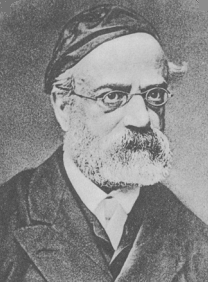
- David Clarkson. "Soul Idolatry Excludes Men from Heaven." In The Practical Works of David Clarkson, Volume II, pages 299ff. Edinburgh: James Nichol, 1865. Reprinted in David Clarkson. Soul Idolatry Excludes Men Out of Heaven. Curiosmith, 2010. ISBN 1-935626-16-7.
- Samson Raphael Hirsch. The Pentateuch: Exodus. Translated by Isaac Levy, volume 2, pages 236–86. Gateshead: Judaica Press, 2nd edition 1999. ISBN 0-910818-12-6. Originally published as Der Pentateuch uebersetzt und erklaert. Frankfurt, 1867–1878.
- Samson Raphael Hirsch. The Jewish Sabbath. Nabu Press, 2010. Originally published Germany, 19th Century.
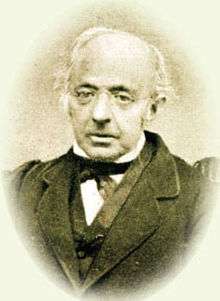
- Samuel David Luzzatto (Shadal). Commentary on the Torah. Padua, 1871. Reprinted in, e.g., Samuel David Luzzatto. Torah Commentary. Translated and annotated by Eliyahu Munk, volume 2, pages 697–768. New York: Lambda Publishers, 2012. ISBN 978-965-524-067-2.
- Samson Raphael Hirsch. The Jewish Sabbath. Frankfurt, before 1889. Translated by Ben Josephussoro. 1911. Reprinted Lexington, Kentucky: CreateSpace Independent Publishing Platform, 2014. ISBN 978-1492373438.
- G. Campbell Morgan. The Ten Commandments. Chicago: Fleming H. Revell Company, 1901. Reprinted BiblioLife, 2009. ISBN 1117422054.
- Yehudah Aryeh Leib Alter. Sefat Emet. Góra Kalwaria (Ger), Poland, before 1906. Excerpted in The Language of Truth: The Torah Commentary of Sefat Emet. Translated and interpreted by Arthur Green, pages 105–09. Philadelphia: Jewish Publication Society, 1998. ISBN 0-8276-0650-8. Reprinted 2012. ISBN 0-8276-0946-9.
- Franklin E. Hoskins. "The Route Over Which Moses Led the Children of Israel Out of Egypt." National Geographic. (December 1909): pages 1011–38.
- Harold H. Rowley. Moses and the Decalogue. George H. Doran Co., 1919.
- Maynard Owen Williams. "East of Suez to the Mount of the Decalogue: Following the Trail Over Which Moses Led the Israelites from the Slave-Pens of Egypt to Sinai." National Geographic. (December 1927): pages 708–43.
- A. M. Klein. "Sacred Enough You Are." Canada, 1940. Reprinted in The Collected Poems of A.M. Klein, page 152. Toronto: McGraw-Hill Ryerson, 1974. ISBN 0-07-077625-3.
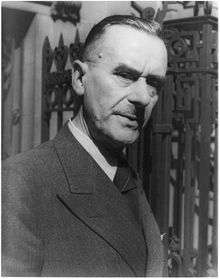
- Thomas Mann. Joseph and His Brothers. Translated by John E. Woods, pages 257, 325, 612, 788. New York: Alfred A. Knopf, 2005. ISBN 1-4000-4001-9. Originally published as Joseph und seine Brüder. Stockholm: Bermann-Fischer Verlag, 1943.
- Thomas Mann, Rebecca West, Franz Werfel, John Erskine, Bruno Frank, Jules Romains, André Maurois, Sigrid Undset, Hendrik Willem van Loon, Louis Bromfield, Herman Rauchning. The Ten Commandments: Ten Short Novels of Hitler's War Against the Moral Code. Edited by Armin L. Robinson. New York: Simon and Schuster, 1943.
- Abraham Joshua Heschel. The Sabbath. New York: Farrar Straus Giroux, 1951. Reprinted 2005. ISBN 0-374-52975-2.
- Morris Adler. The World of the Talmud, pages 28–29. B'nai B'rith Hillel Foundations, 1958. Reprinted Kessinger Publishing, 2007. ISBN 0-548-08000-3.
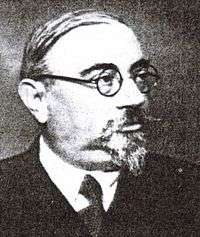
- Umberto Cassuto. A Commentary on the Book of Exodus. Jerusalem, 1951. Translated by Israel Abrahams, pages 209–57. Jerusalem: The Magnes Press, The Hebrew University, 1967.
- Johann J. Stamm and Maurice E. Andrew. The Ten Commandments in Recent Research. Naperville, Illinois: Alec R. Allenson, 1967.
- Martin Buber. On the Bible: Eighteen studies, pages 80–121. New York: Schocken Books, 1968.
- Anthony Phillips. Ancient Israel's Criminal Law: A New Approach to the Decalogue. Oxford: Basil Blackwell, 1970. ISBN 0-631-12280-X.
- Eduard Nielsen. The Ten Commandments in New Perspective. Alec R. Allenson, 1968. Reprinted Hymns Ancient & Modern Ltd, 2012. ISBN 0334016126.
- Anthony Phillips. Ancient Israel's Criminal Law: A New Approach to the Decalogue. Basil Blackwell, 1970. ISBN 0-631-12280-X.

- W. Gunther Plaut. Shabbat Manual. New York: CCAR, 1972.
- Harvey Arden. "In Search of Moses." National Geographic. (January 1976): pages 2–37.
- Elie Munk. The Call of the Torah: An Anthology of Interpretation and Commentary on the Five Books of Moses. Translated by E.S. Mazer, volume 2, pages 230–91. Brooklyn: Mesorah Publications, 1995. ISBN 0-89906-042-0. Originally published as La Voix de la Thora. Paris: Fondation Samuel et Odette Levy, 1981.
- Walter J. Harrelson. The Ten Commandments and Human Rights. Philadelphia: Fortress Press, 1980. ISBN 0-8006-1527-1. Revised edition. Mercer University Press, 1997. ISBN 0-86554-542-1.
- Harvey Arden. "Eternal Sinai." National Geographic, volume 161 (number 4) (April 1982): pages 420–61.
- David Noel Freedman. "The Nine Commandments: The secret progress of Israel's sins." Bible Review, volume 5 (number 6) (December 1989).
- Krzysztof Kieślowski. The Decalogue. Warsaw: Sender Freies Berlin (SFB), Telewizja Polska (TVP), and Zespol Filmowy "Tor," 1989.
- Moshe Weinfeld. "What Makes the Ten Commandments Different?" Bible Review, volume 7 (number 2) (April 1991).
- Pinchas H. Peli. The Jewish Sabbath: A Renewed Encounter. New York: Schocken, 1991. ISBN 0-8052-0998-0.
- Nahum M. Sarna. The JPS Torah Commentary: Exodus: The Traditional Hebrew Text with the New JPS Translation, pages 97–117. Philadelphia: Jewish Publication Society, 1991. ISBN 0-8276-0327-4.
- Moshe Halbertal and Avishai Margalit. Idolatry. Translated by Naomi Goldblum. Cambridge, Massachusetts: Harvard University Press, 1992. ISBN 0-674-44312-8.
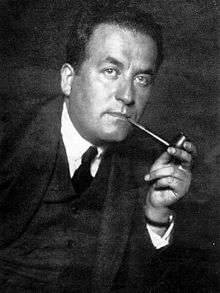
- Nehama Leibowitz. New Studies in Shemot (Exodus), volume 1, pages 290–360. Jerusalem: Haomanim Press, 1993. Reprinted as New Studies in the Weekly Parasha. Lambda Publishers, 2010. ISBN 965-524-038-X.
- S.Y. Agnon. Present at Sinai: The Giving of the Law. Philadelphia: Jewish Publication Society, 1994. ISBN 0-8276-0503-X.
- Walter Brueggemann. “The Book of Exodus.” In The New Interpreter's Bible. Edited by Leander E. Keck, volume 1, pages 823–62. Nashville: Abingdon Press, 1994. ISBN 0-687-27814-7.
- Elliot N. Dorff. "Artificial Insemination, Egg Donation and Adoption." New York: Rabbinical Assembly, 1994. EH 1:3.1994. Reprinted in Responsa: 1991–2000: The Committee on Jewish Law and Standards of the Conservative Movement. Edited by Kassel Abelson and David J. Fine, pages 461, 483, 506. New York: Rabbinical Assembly, 2002. ISBN 0-916219-19-4. (duty of the children of artificial insemination to honor their social parents; implications of the duty to honor parents for single parenthood).
- Judith S. Antonelli. "The House of Jacob." In In the Image of God: A Feminist Commentary on the Torah, pages 175–184. Northvale, New Jersey: Jason Aronson, 1995. ISBN 1-56821-438-3.
- Elliot N. Dorff. "Jewish Businesses Open on Shabbat and Yom Tov: A Concurring Opinion." New York: Rabbinical Assembly, 1995. OH 242.1995c. Reprinted in Responsa: 1991–2000: The Committee on Jewish Law and Standards of the Conservative Movement. Edited by Kassel Abelson and David J. Fine, pages 64–70. New York: Rabbinical Assembly, 2002. ISBN 0-916219-19-4.
- Elliot N. Dorff. "Family Violence." New York: Rabbinical Assembly, 1995. HM 424.1995. Reprinted in Responsa: 1991–2000: The Committee on Jewish Law and Standards of the Conservative Movement. Edited by Kassel Abelson and David J. Fine, pages 773, 786. New York: Rabbinical Assembly, 2002. ISBN 0-916219-19-4. (implications of the commandment to honor one's parents for a duty to provide for dependent parents).
- Marc Gellman. God's Mailbox: More Stories About Stories in the Bible, pages 47–67. New York: Morrow Junior Books, 1996. ISBN 0-688-13169-7.
- Mark Dov Shapiro. Gates of Shabbat: A Guide for Observing Shabbat. New York: CCAR Press, 1996. ISBN 0-88123-010-3.
- Elliot N. Dorff. "Assisted Suicide." New York: Rabbinical Assembly, 1997. YD 345.1997a. Reprinted in Responsa: 1991–2000: The Committee on Jewish Law and Standards of the Conservative Movement. Edited by Kassel Abelson and David J. Fine, pages 379, 380. New York: Rabbinical Assembly, 2002. ISBN 0-916219-19-4. (implications of God's ownership of the universe for assisted suicide).
- Sorel Goldberg Loeb and Barbara Binder Kadden. Teaching Torah: A Treasury of Insights and Activities, pages 113–20. Denver: A.R.E. Publishing, 1997. ISBN 0-86705-041-1.
- Baruch J. Schwartz. "What Really Happened at Mount Sinai? Four biblical answers to one question." Bible Review, volume 13 (number 5) (October 1997).
- William H.C. Propp. Exodus 1–18, volume 2, pages 622–35. New York: Anchor Bible, 1998. ISBN 0-385-14804-6.
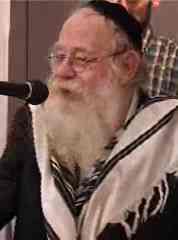
- Adin Steinsaltz. Simple Words: Thinking About What Really Matters in Life, pages 49, 182. New York: Simon & Schuster, 1999. ISBN 0-684-84642-X.
- Exodus to Deuteronomy: A Feminist Companion to the Bible (Second Series). Edited by Athalya Brenner, pages 21, 34–35, 37, 39, 70, 163–64, 166, 170. Sheffield: Sheffield Academic Press, 2000. ISBN 1-84127-079-2.
- David Noel Freedman. The Nine Commandments: Uncovering a Hidden Pattern of Crime and Punishment in the Hebrew Bible. New York: Doubleday, 2000. ISBN 0-385-49986-8.
- Lainie Blum Cogan and Judy Weiss. Teaching Haftarah: Background, Insights, and Strategies, pages 230–39. Denver: A.R.E. Publishing, 2002. ISBN 0-86705-054-3.
- Elie Kaplan Spitz. "Mamzerut." New York: Rabbinical Assembly, 2000. EH 4.2000a. Reprinted in Responsa: 1991–2000: The Committee on Jewish Law and Standards of the Conservative Movement. Edited by Kassel Abelson and David J. Fine, pages 558, 562–63, 566. New York: Rabbinical Assembly, 2002. ISBN 0-916219-19-4. (implications of the prohibition of adultery and God's remembering wrongdoing until the third or fourth generation for the law of the mamzer).
- Joseph Telushkin. The Ten Commandments of Character: Essential Advice for Living an Honorable, Ethical, Honest Life, pages 52–59, 61–65, 76–80, 129–32, 177–80, 189–90, 204–06, 275–78. New York: Bell Tower, 2003. ISBN 1-4000-4509-6.
- Jeffrey H. Tigay. "Exodus." In The Jewish Study Bible. Edited by Adele Berlin and Marc Zvi Brettler, pages 143–52. New York: Oxford University Press, 2004. ISBN 0-19-529751-2.
- Walter J. Harrelson. The Ten Commandments for Today. Louisville, Kentucky: Westminster John Knox Press, 2006. ISBN 0-664-22931-X.
- W. Gunther Plaut. The Torah: A Modern Commentary: Revised Edition. Revised edition edited by David E.S. Stern, pages 468–509. New York: Union for Reform Judaism, 2006. ISBN 0-8074-0883-2.
- William H.C. Propp. Exodus 19–40, volume 2A, pages 101–85. New York: Anchor Bible, 2006. ISBN 0-385-24693-5.
- Suzanne A. Brody. "Shabbat" and "Talking at Sinai." In Dancing in the White Spaces: The Yearly Torah Cycle and More Poems, pages 51–57, 79. Shelbyville, Kentucky: Wasteland Press, 2007. ISBN 1-60047-112-9.
- Esther Jungreis. Life Is a Test, pages 208, 227. Brooklyn: Shaar Press, 2007. ISBN 1-4226-0609-0.
- Adam Potkay. "Icons and Iconoclasm from Moses to Milton." Lecture 3 in The Modern Scholar: The Bible and the Roots of Western Literature. Prince Frederick, Maryland: Recorded Books, 2008.
- The Torah: A Women's Commentary. Edited by Tamara Cohn Eskenazi and Andrea L. Weiss, pages 407–26. New York: URJ Press, 2008. ISBN 0-8074-1081-0.
- Timothy Keller. Counterfeit Gods: The Empty Promises of Money, Sex, and Power, and the Only Hope that Matters. Dutton Adult, 2009. ISBN 0-525-95136-9. (What is an idol? It is anything more important to you than God, anything that absorbs your heart and imagination more than God, anything you seek to give you what only God can give.).
- Frank Newport. "Extramarital Affairs, Like Sanford's, Morally Taboo: Recent Confessions of Affairs by Elected Officials Fly in Face of Americans' Normative Standards" Gallup Inc. June 25, 2009.
- Ziv Hellman. "And on the Seventh Day: Israelis ponder the public nature of the Shabbath in a state that seeks to be both Jewish and democratic." The Jerusalem Report, volume 20 (number 19) (January 4, 2009): pages 26–30.
- Patrick D. Miller. The Ten Commandments: Interpretation: Resources for the Use of Scripture in the Church. Louisville, Kentucky: Westminster John Knox Press, 2009. ISBN 978-0-664-23055-5.
- "Day of Rest: Judith Shulevitz's New Book Considers the Sabbath Throughout the Ages and in Her Own Life." Tablet Magazine. (March 15, 2010).
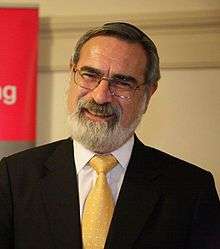
- "Body Image: An Art Historian Tackles the Thorny Matter of Jews and Figurative Painting." Tablet Magazine. (June 7, 2010). (the commandment not to make graven images and Jewish artists).
- Jonathan Sacks. Covenant & Conversation: A Weekly Reading of the Jewish Bible: Exodus: The Book of Redemption, pages 125–55. Jerusalem: Maggid Books, 2010. ISBN 159-264-0214.
- Joseph Telushkin. Hillel: If Not Now, When? pages 55–57. New York: Nextbook, Schocken, 2010. ISBN 978-0-8052-4281-2. (honoring father and mother).
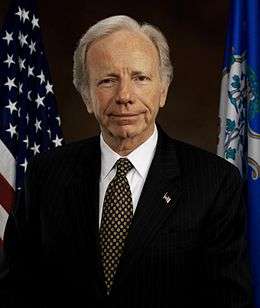
- Joe Lieberman and David Klinghoffer. The Gift of Rest: Rediscovering the Beauty of the Sabbath. New York: Howard Books, 2011. ISBN 1-4516-0617-6.
- United Nations Office on Drugs and Crime. Homicide Statistics. 2011.
- The Decalogue through the Centuries: From the Hebrew Scriptures to Benedict XVI. Edited by Jeffrey P. Greenman and Timothy Larsen. Louisville, Kentucky: Westminster John Knox Press, 2012. ISBN 978-0-664-23490-4.
- Micha Feldmann. On Wings of Eagles: The Secret Operation of the Ethiopian Exodus. Jerusalem: Gefen Publishing House, 2012. (Exodus 19:4 used to describe exodus of Ethiopian Jews).
- Jonathan Haidt. The Righteous Mind: Why Good People Are Divided by Politics and Religion, page 256. New York: Pantheon, 2012. ISBN 978-0-307-37790-6. (prohibition of murder, adultery, false witness, and oath-breaking as an evolutionary advantage).

- Shmuel Herzfeld. "You Shall Not (Be an Accessory to) Murder." In Fifty-Four Pick Up: Fifteen-Minute Inspirational Torah Lessons, pages 100–04. Jerusalem: Gefen Publishing House, 2012. ISBN 978-965-229-558-3.
- Torah MiEtzion: New Readings in Tanach: Shemot. Edited by Ezra Bick and Yaakov Beasley, pages 235–88. Jerusalem: Maggid Books, 2012. ISBN 161-329-0071.
- Daniel S. Nevins. “The Use of Electrical and Electronic Devices on Shabbat.” New York: Rabbinical Assembly, 2012.
- Adam Kirsch. "Ancient Laws for Modern Times: When is a tent just a tent and not like a bed or a hat? To update Jewish laws, the rabbis reasoned by analogy." Tablet Magazine. (February 26, 2013). (Shabbat).
- Adam Kirsch. "Leave the Jewish People Alone: Rabbis left enforcement of their Talmudic decrees to communal standards and voluntary commitment." Tablet Magazine. (March 5, 2013). (Shabbat).

- Adam Kirsch. "Written in the Stars (Or Not): To overcome fated lives, the Talmud's rabbis argued, perform virtuous acts according to Torah." Tablet Magazine. (March 12, 2013). (Shabbat).
- Adam Kirsch. "Navigating the Talmud's Alleys: The range of problems and the variety of answers in the study of Oral Law lead to new pathways of reasoning." Tablet Magazine. (March 18, 2013). (Shabbat).
- Leon R. Kass. "The Ten Commandments: Why the Decalogue Matters." Mosaic Magazine. (June 2013).
- Peter Berkowitz. "The Decalogue and Liberal Democracy: Response to: 'The Ten Commandments.'" Mosaic Magazine. (June 2013).
- Amiel Ungar. "Tel Aviv and the Sabbath." The Jerusalem Report, volume 24 (number 8) (July 29, 2013): page 37.

- Pope Francis. "No to the new idolatry of money." In Evangelii gaudium (The Joy of the Gospel). Vatican City: The Holy See, 2013.
- Amanda Terkel. "Glenn Grothman, Wisconsin GOP Senator, Fights for a Seven-Day Workweek." The Huffington Post. (January 3, 2014, updated January 23, 2014). (Congressional candidate said, "Right now in Wisconsin, you're not supposed to work seven days in a row, which is a little ridiculous because all sorts of people want to work seven days a week.")
- Daniel Landes. "The quintessential convert: Why did Jethro need to embrace even more responsibility?" The Jerusalem Report, volume 24 (number 21) (January 27, 2014): page 47.
- Ester Bloom. "The Crazy New App for Using Your iPhone on Shabbos." Jewniverse. (October 1, 2014).
- “The Crazy New Invention for Using Electricity on Shabbat.” Jewniverse. (April 21, 2015).
See also
External links
